4 The Spiritual And Perpetual Covenants—Redemption And Works
A Summary Of The Teaching Video
Some of the points I cover in this teaching video:
I believe the major biblical covenants may be arranged under two headings: (1) Two spiritual and perpetual covenants—Redemption and Works; (2) Four earthly and temporary covenants—Noahic, Abrahamic, Mosaic and Davidic. The New Covenant, properly speaking, is not an actual covenant, but rather, an explanation of the Covenant of Redemption to the Jewish people as a nation, within the context of the Mosaic economy and its laws.
In this study, an explanation is given for the two spiritual and perpetual covenants: First, aligning these covenants with the Framework of Sovereign Grace; Second, emphasizing how the Covenant of Redemption is one and the same with the Covenant of Grace; Third, showing why the Covenants of Works and Redemption are identified as “spiritual” and “perpetual”.
[As a side note, the Reformed Baptist denomination, a section of which has amped up its claims to be the modern day representatives of the English Particular Baptists, subscribe to a seventeenth century covenantal framework reflective of the Westminster Confession of Faith and that of Presbyterianism. In their view, the covenant of redemption is relegated to the backdrop of an ‘eternity past’ with a conditional covenant of works God made with Adam before the Fall and a conditional covenant of grace God made (or promised to make) with the elect in Christ after the Fall. They do not understand the Particular Baptists of succeeding centuries rejected the notion of a conditional covenant of grace, believing there to be only the covenant of redemption (which they termed the covenant of grace) and the covenant of works God made with Adam before the Fall. Benjamin Keach, for instance, while signing the 1689 Baptist Confession, three years later confessed to changing his view on Article 7, rejecting an additional (and conditional) covenant of grace. That the Reformed Baptists, generally speaking, do not understand the reforms and developments of the Particular Baptists of succeeding centuries is epitomized by a statement made by one of their popular leaders. I will not disclose the name as I wish not to embarrass or spark a controversy, but he wrote that “Benjamin Keach…denied the covenant of redemption. Keach was aware that this set him apart from others.” No, Keach denied an additional (and conditional) covenant of grace, believing the covenant of grace is one and the same with the covenant of redemption. This is the view to which I hold and it is the representative view of the mainstream Particular Baptists of the eighteenth to twenty-first centuries. Yes, we (the Particular Baptists) still exist today as a separate denomination. Just because the Reformed Baptists have adopted the 1689 Baptist Confession as their statement of faith, does not make them Particular Baptists or representatives thereof.]
Jared Smith, Muntinlupa, PH (18/11/2022)
An Outline Of The Teaching Video
The Arrangement Of The Biblical Covenants
Another Look At The Framework Of Sovereign Grace
Biblical Authority For The Covenants Of Redemption And Works
The Covenant Of Works
Genesis 2:15-17
Matthew 22:35-40
Romans 2:14,15
The Covenant Of Redemption
2 Samuel 23:1-5
Hebrews 13:20,21
John 6:37,38
John 17:4-6
2 Thessalonians 2:13,14
1 Peter 1:1,2
2 Corinthians 13:14
Recommended Commentaries For Further Study
My Explanation Of The Covenants Of Redemption And Works
The Electing Love Of God The Father
The Creation Of The World And The Time Continuum
The Authority By Which The Human Race Would Be Put Into Relationship With God—A Covenant Of Works
The Fall Of Adam And Its Ramifications Upon The Human Race
The Reprobation Of The Non-Elect
The Salvation Of The Elect
The Redeeming Grace Of God The Son
The Twofold Problem Of Sin And God The Father’s Plan To Solve Them
The Sanctifying Power Of God The Spirit
The Doctrines Of Grace—A Covenant Of Redemption Between The Father, Son and Holy Spirit
Different Names Given For The Covenant Of Redemption
The Everlasting Covenant
The Covenant Of Peace
The Covenant Of Redemption
The Covenant Of Grace
The Error Of Distinguishing Between A Covenant Of Redemption From Eternity And A Covenant Of Grace In Time
The 1646 Westminster Confession Is At Fault On This Matter
The 1689 Baptist Confession Is At Fault On This Matter
The Presbyterians And Reformed Baptists Are Self-Acclaimed Confessionalists
Benjamin Keach Denounced This Distinction As A Grave Error
John Gill Agreed With The Testimony And Conclusions Of Benjamin Keach
I Agree With The Testimony And Conclusion Of Keach And Gill
A Side Note—Technically Speaking, Every Covenant Is By Nature Conditional
An Explanation On Why The Covenants Of Redemption And Works Are Identified As Spiritual And Perpetual
They Are Spiritual Covenants
The Entire Human Race, Throughout The Course Of History, Is In Relationship Either TO God Under The Authority Of The Covenant Of Works (In An Unregenerate Condition), Or WITH God Under The Authority Of The Covenant Of Redemption (In A Regenerate Condition)
Throughout The Course Of History, God Administers His Grace To The Human Race—A Common Grace Unto Creation To The Non-Elect (With No Saving Virtue), And A Special Grace Unto Salvation To The Elect (With All Saving Virtue)
They Are Perpetual Covenants
They Were Activated In The Garden Of Eden And Will Continue Forever
The Elect Will Forever Be Under The Authority And Blessings Of The Covenant Of Redemption In Heaven
The Non-Elect Will Forever Be Under The Authority And Curse Of The Covenant Of Works In Hell
At No Time Are The Non-Elect Released From The Covenant Of Works, Nor The Elect Released From The Covenant Of Redemption
A Final Word
The Two Spiritual Covenants Transcend The Four Earthly Covenants
Your Responsibility Towards God Is Determined And Defined By The Covenant Under Which You Are Subject To Him
To Avoid Confusion And Evade Error, Do Not Conflate The Two Spiritual Covenants With The Four Earthly Covenants
An Automated Transcript Of The Teaching Video
I’d like to welcome you back for another study in the Word of God. For today, we’re going to be looking at the subject of the two spiritual and perpetual covenants—the Covenant of Works and the Covenant of Grace.
The Arrangement Of The Biblical Covenants
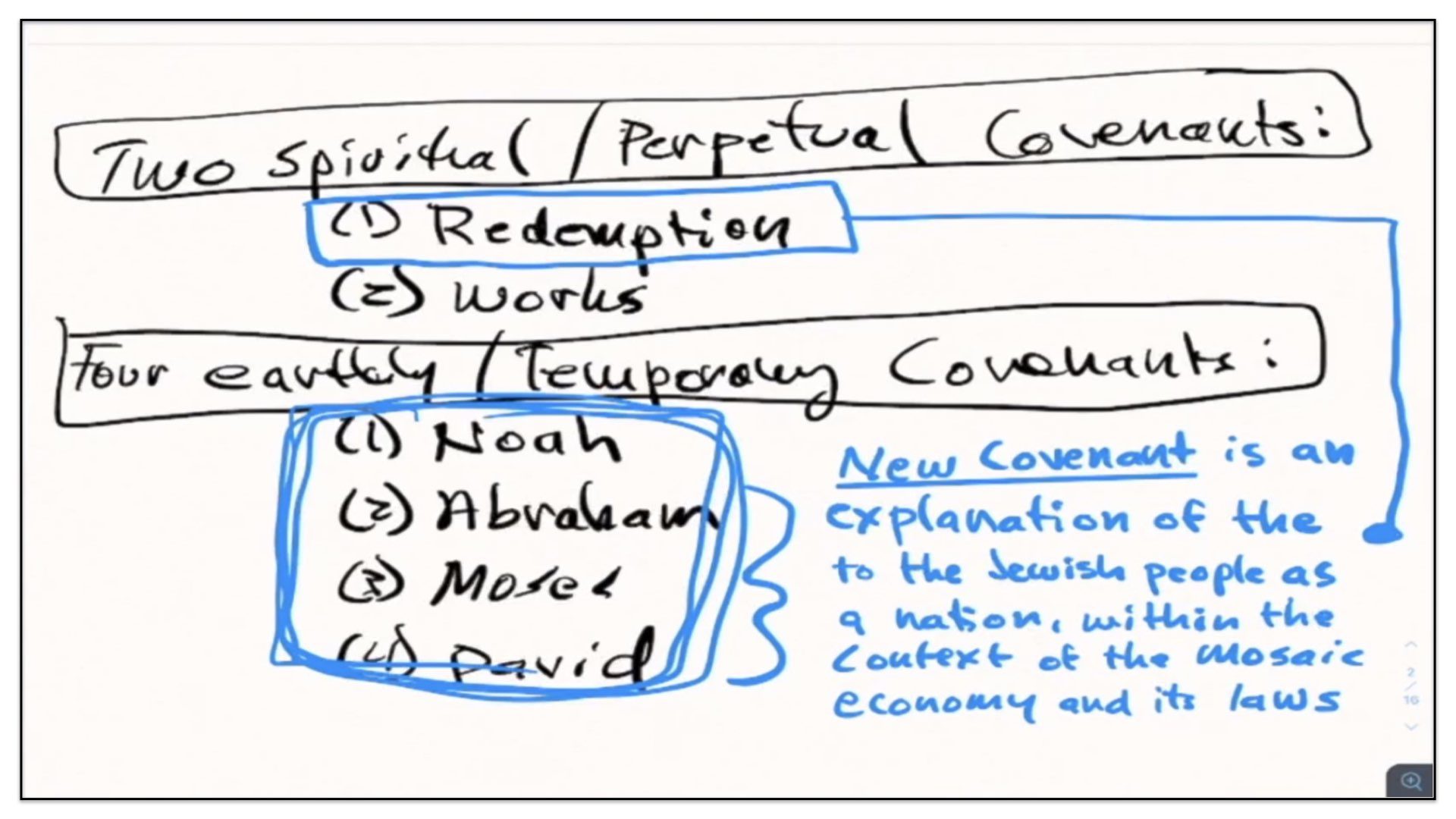
You’ll remember in our previous study, I pointed out to you my view on how the covenants are arranged. They’re in two categories. The first of these are what I call the two spiritual and perpetual covenants. And this would be the Covenant of Redemption and the Covenant of Works. And the second category are the four earthly and temporary covenants. And there’s four, as I say—the Noahic Covenant, the Abrahamic, the Mosaic and the Davidic. And aside from these two categories I highlight for you, what’s known as the New Covenant, something the Prophet Jeremiah, the Lord Jesus Christ and the Apostle Paul makes reference to. And I don’t believe that the New Covenant is actually a covenant in and of itself. Rather, I believe the New Covenant is an explanation to the Jewish people as a nation who were then living at the at the time of Christ and His Apostles—an explanation concerning the Covenant of Redemption within the context of the Mosaic economy and its laws. Now I think if you read the Old and New Testaments with that in mind, it’ll make a lot more sense than the definition given to the New Covenant by the Presbyterians or the Reformed Baptists. Well, in a nutshell, that’s my basic view on how the covenants are arranged.
Another Look At The Framework Of Sovereign Grace
Now, I mentioned last week that I would not be bringing a special study to you on the two spiritual and permanent covenants, namely because if you have followed my teaching ministry for any length of time, you’ll know every one of my teaching videos—every one of my studies—is based on the main structure of these two permanent covenants. And I therefore take for granted that most, if not all, of you know the meaning of these two covenants and why I call them spiritual and perpetual. However, after last week’s teaching, someone asked me if I would bring a special study on the two spiritual and perpetual covenants within the context of how I distinguished them from the earthly and temporary covenants. I can only say I’m happy to do that. So, for this study, I will be bringing a special teaching on these first two covenants—Redemption and Works, under the general heading of the spiritual and perpetual covenants.
Biblical Authority For The Covenants Of Redemption And Works
Now, before I begin with any explanation of these two covenants, I’d like to read for you a selection of scriptures, so that this week you’ll be able to take those scriptures and study them out for yourself. I’m not going to give you a commentary of them in this study. I’m just gonna read them to you and you can make a note of the references and then you can study these for yourself, especially in light of the explanations I will be making in this study.
The Covenant Of Works
Well, let’s begin with the Covenant of Works. And I have three scriptures I would like to read for you.
Genesis 2:15-17
The first of these is found in Genesis chapter 2, and I’ll be reading for you beginning in verse 15—“And the LORD God took the man, and put him into the garden of Eden to dress it and to keep it. And the LORD God commanded the man, saying, Of every tree of the garden thou mayest freely eat: But of the tree of the knowledge of good and evil, thou shalt not eat of it: for in the day that thou eatest thereof thou shalt surely die.” I believe that’s a reference to what’s called the Covenant of Works.
Matthew 22:35-40
I’d like to read for you a second scripture in connection to this covenant and it’s Matthew chapter 22. In Matthew chapter 22, I like to begin reading for you in verse 35. We find a lawyer who asked Christ a question, tempting Him and saying, “Master, which is the great commandment in the law?” Now, that’s a reference to the Mosaic law. There are over 600 of those laws. Verse 37—“Jesus said unto him, Thou shalt love the Lord thy God with all thy heart, and with all thy soul, and with all thy mind. This is the first and great commandment. And the second is like unto it, Thou shalt love thy neighbour as thyself. On these two commandments hang all the law and the prophets.” Now the reason I read this for you in connection to the Covenant of Works is not because I believe the Mosaic Covenant should be identified as the Covenant of Works, but rather, Jesus reduces the commandments given to Moses by God to two basic commands or laws—first, to love God supremely, and second, to love one’s neighbor as him or herself. I believe that is the law God has inscribed upon the heart. That’s the two-fold law that God inscribed upon the heart of Adam, insomuch that when God told Adam not to eat of the fruit of the tree of the knowledge of good and evil, that command was based upon these great commandments—to love God supremely; to love our neighbor as ourself. God had set one tree of all the trees apart for Himself, in special honor to Himself. It was sanctified for Him alone. And Adam and Eve chose to take that which God set apart for Himself. They chose to eat of that tree. And you see, that was the violation of the heart law. They did not love God supremely as they should have done. See, that’s what I call the heart law. And that’s the second passage I’ve read for you.
Romans 2:14,15
There’s a third passage I’d like to read for you in connection to the Covenant of Works, and this one is found in Paul’s epistle to the Romans, Chapter 2, and I’d like to begin reading for you in verse 14: “For when the Gentiles,”—of course, Gentiles are those who are not Jewish; “For when the Gentiles which have not the law,”—that would be the Mosaic Law; “Do by nature the things contained in the (Mosaic) law, these (Gentiles), having not the (Mosaic) law, are a law unto themselves:”—meaning that they are not without law. They might not have the laws given to the children of Israel within the Covenant of Moses, but they do have laws given to them by God. Verse 15, “Which shew the work of the law written in their hearts,”—that’s why I call this the heart law. God has inscribed a law upon the heart—to love Him supremely; to love our neighbor as ourselves, which is why “their conscience (of every man and woman, whether they be Jew or Gentile), also bearing witness, and their thoughts the mean while accusing or else excusing one another.” It’s the basic measure, or standard, of morality; of right from wrong. That’s what God has inscribed upon the heart—the heart law. And you see, these are the two, or rather the three, scriptures I would like to ask you to meditate on as it relates to the Covenant of Works.
The Covenant Of Redemption
Let me read to you now some scriptures related to the Covenant of Redemption.
2 Samuel 23:1-5
And I’d like to begin with Second Samuel, Chapter 23 and I’ll begin reading for you in verse 1. Second Samuel 23 and verse 1—“Now these be the last words of David. David the son of Jesse said, and the man who was raised up on high, the anointed of the God of Jacob, and the sweet psalmist of Israel, said, The Spirit of the LORD spake by me, and his word was in my tongue. The God of Israel said, the Rock of Israel spake to me, He that ruleth over men must be just, ruling in the fear of God. And he shall be as the light of the morning, when the sun riseth, even a morning without clouds; as the tender grass springing out of the earth by clear shining after rain. Although my house be not so with God; yet he hath made with me an everlasting covenant, ordered in all things, and sure: for this is all my salvation, and all my desire, although he make it not to grow.” And I believe David’s reference to an everlasting covenant and this deathbed confession is a reference to the Covenant of Redemption—a covenant drawn up from eternity between the Father, Son and Spirit—and the other parts of David’s words are a prophecy of the coming Messiah. That’s the first passage regarding the Covenant of Redemption.
Hebrews 13:20,21
Let me read another passage, this time from the New Testament, and I would like to turn your attention to the last chapter of Hebrews. Hebrews chapter 13, and I’ll read for you from verse 20. These are among the closing words of the Apostle Paul as he wrote this letter to the Hebrew Christians—“Now the God of peace, that brought again from the dead our Lord Jesus, that great shepherd of the sheep, through the blood of the everlasting covenant, make you perfect in every good work to do his will, working in you that which is wellpleasing in his sight, through Jesus Christ; to whom be glory for ever and ever. Amen.” Now, in these verses you have a reference once more to an everlasting covenant. And here you find the three Persons of the Godhead referenced—the work of the Father, Son and Spirit.
John 6:37,38
Let me read to you a couple of statements made by Jesus Himself with special regards to that covenant between the Father and the Son. The first of these is found in the gospel according to John, Chapter 6, and I’d like to read for you from verse 37. Jesus said, “All that the Father giveth me shall come to me; and him that cometh to me I will in no wise cast out. For I came down from heaven, not to do mine own will, but the will of him that sent me.” Ah, I dear friends, what else could this mean but the agreement, the covenant, made between the Father and the Son from eternity, from which the Son came into this world in the Person of the Lord Jesus Christ in order that He might do His Father’s will, according to that gracious, or redemptive covenant, from eternity?
John 17:4-6
Another passage in the gospel according to John is found in the 17th chapter and I’d like to begin reading for you in verse 4. These are the words Jesus spoke to His Father in one of the last prayers before His death. Jesus said, “I have glorified thee on the earth:”—this is Jesus speaking to the Father. “I have finished the work which thou gavest me to do. And now, O Father, glorify thou me with thine own self with the glory which I had with thee before the world was. I have manifested thy name unto the men which thou gavest me out of the world: thine they were, and thou gavest them me; and they have kept thy word.” Once again, how else can these words be interpreted, but a reference to that eternal agreement between the Father and Son for the redemption of the elect?
2 Thessalonians 2:13,14
Now, there’s a few passages, well, many other passages, that reference this Covenant of Redemption, but do not use the language and I’d like to just highlight two or three of those for you, and then we’ll move on to my explanations in this study. The first of these passages—still looking at the Covenant of Redemption, of course—the first of these passages is found in second Thessalonians chapter 2 and verse 13. The Apostle Paul wrote—”But we are bound to give thanks alway to God for you, brethren beloved of the Lord, because God hath from the beginning chosen you to salvation,”—there’s the work of the Father. “Through sanctification of the Spirit and belief of the truth:”—that’s the work of the Spirit. “Whereunto he called you by our gospel, to the obtaining of the glory of our Lord Jesus Christ”—that’s the work of God the Son.
1 Peter 1:1,2
Another passage that speaks of something similar is found in first Peter chapter 1 and the opening words of the letter, where Peter identifies the group of people to whom he’s writing this letter in verse 1. He first identifies himself as the author, “Peter, an apostle of Jesus Christ, to the strangers scattered throughout Pontus, Galatia, Cappadocia, Asia, and Bithynia.” Now Peter identifies those to whom he writes the letter—“Elect according to the foreknowledge of God the Father,”—that’s the work of the Father. “Through sanctification of the Spirit,”—the work of the Spirit. “Unto obedience and sprinkling of the blood of Jesus Christ:”—that’s the work of the Son, and in fact, the sum total work of justification, for we are justified by the active obedience of Christ when He fulfilled the heart law for us, and we are delivered from our sins and forgiven and pardoned by the atoning blood of Christ, or the sprinkling of the precious blood of the Lord Jesus. And you see, here we have once again a reference in the opening statement of this letter to this Covenant of Redemption.
2 Corinthians 13:14
The final passage I’ll read for you on the topic of the Covenant of Redemption is found in second Corinthians, this time not the opening statement of a letter, but the closing words of this letter, verse 14: “The grace of the Lord Jesus Christ,”—that’s the work of the Son. “And the love of God,”—that’s the electing love of God the Father. “And the communion (or the communication) of the Holy Ghost,”—the work of the Holy Spirit. “Be with you all. Amen.”
Recommended Commentaries For Further Study
So, whether it’s a salutation that Peter uses, or a benediction that Paul uses, or it’s found in the middle of a letter where Paul thanks God on the behalf of those that are saved, or Paul’s explanation in Hebrews or David’s deathbed confession, we have many scriptures that refer to, or directly speak of, this Covenant of Redemption. So I’ll leave it to you to take the scriptures and study them out for yourself this week. And if you’re looking for a recommended commentary on the subject, I would recommend two. Look up John Gill. And then look up Robert Hawker. Both of these men provide commentaries on the texts and I would trust those men to give some guidance to you on the meaning of those passages of scripture.
My Explanation Of The Covenants Of Redemption And Works
Okay, well, I would like to get into my explanations of the two spiritual and perpetual covenants.
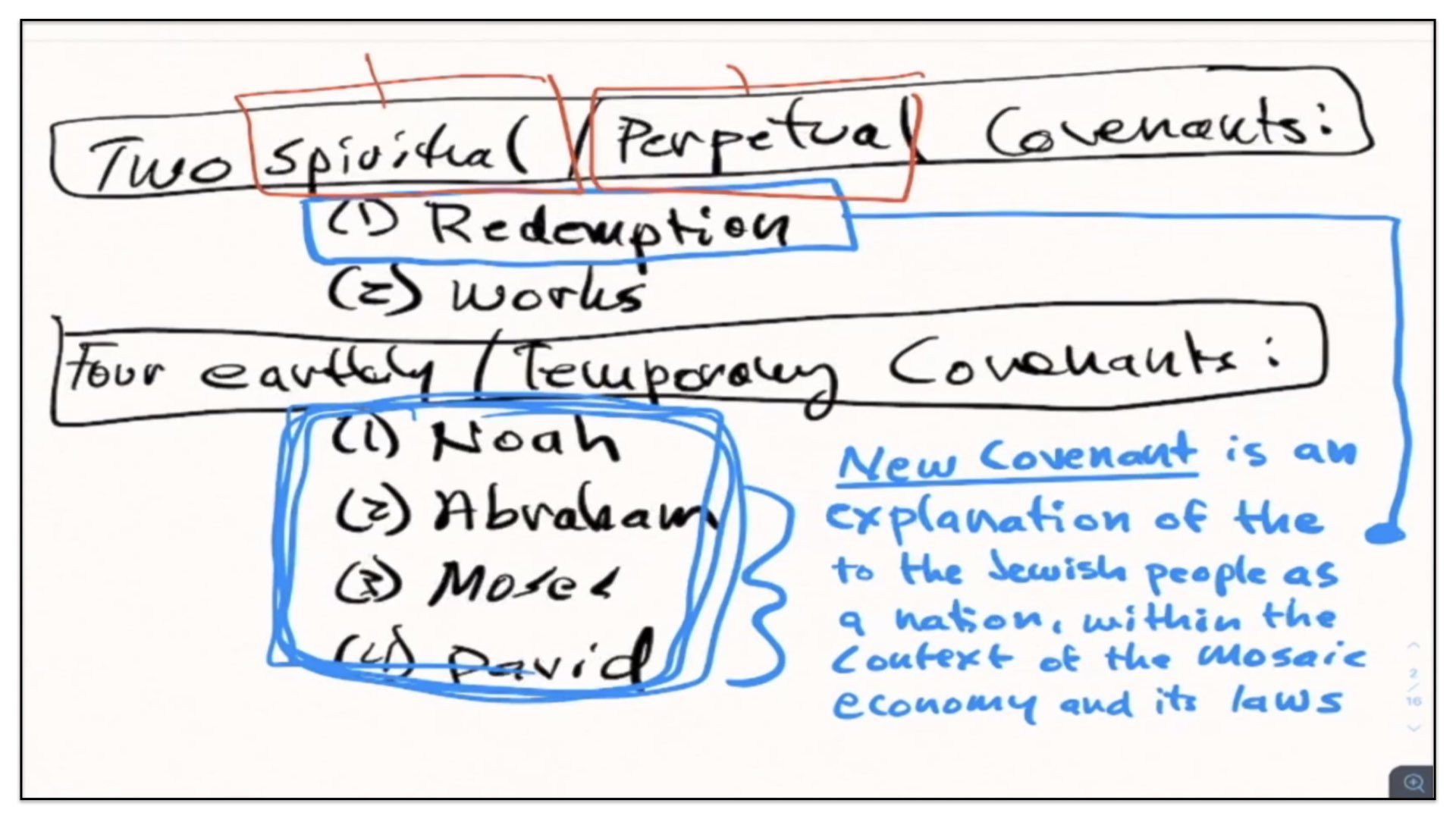
In a few moments I’m going to be explaining directly why I call these two covenants spiritual and perpetual. But before I give—that explanation will be just towards the end of our study—so I’ll be able to summarize my explanation of these two points rather briefly.
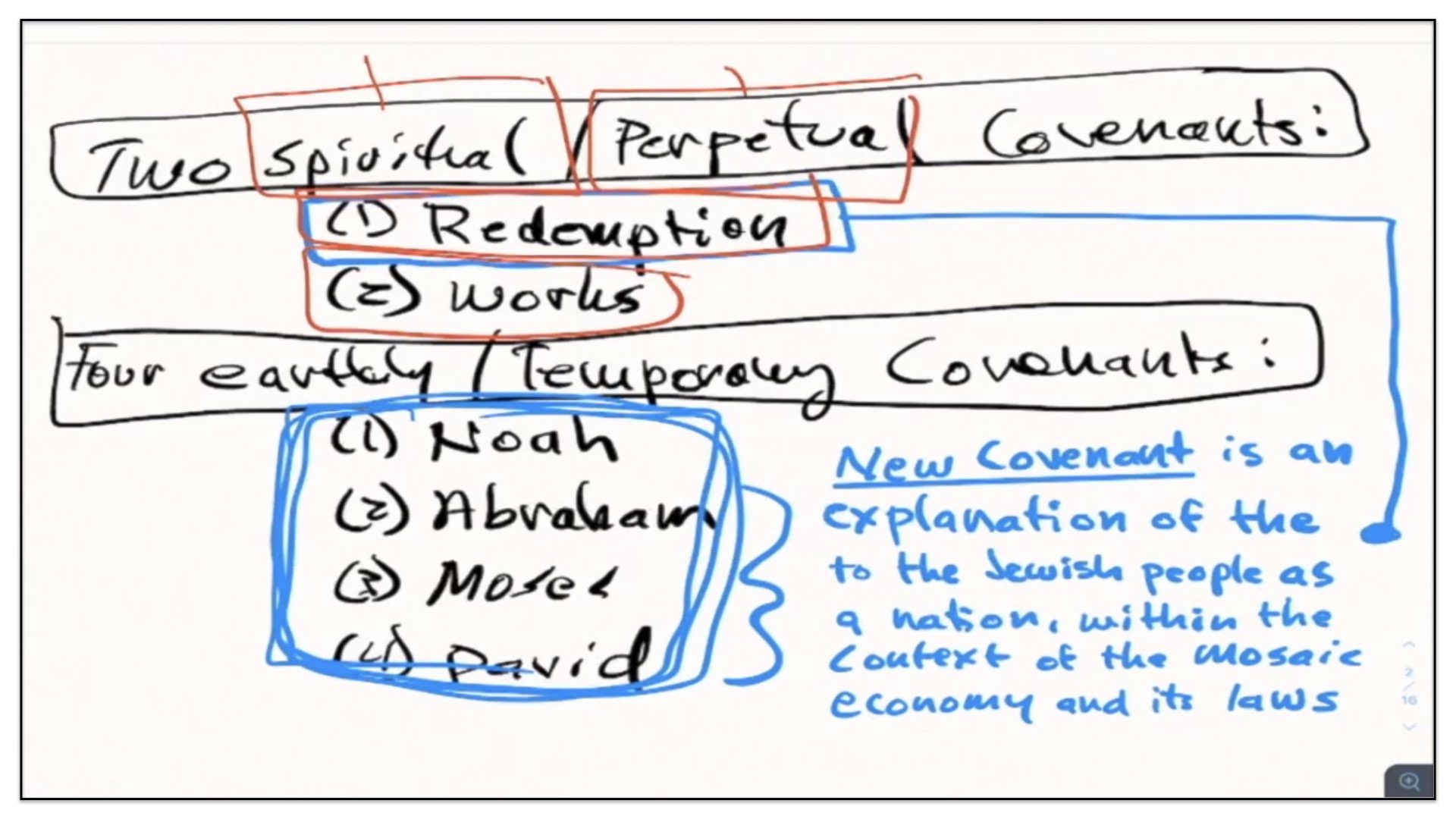
I do need to preface my statements, however, with an explanation on what the Covenant of Redemption and the Covenant of Works are.
Now, I understand many, if not most of you, all of you, follow my teaching ministry for a sufficient length of time that you will have heard this summary or explanation many times over. So I’m going to ask for your patience and take this opportunity to check yourself to be sure that you’ve understood fully what it is I’ve attempted to explain in previous studies on the meaning of these covenants. And of course, if you’re joining us for the first time, or the second or third time, and you really don’t know what I mean by these two covenants, well, I’m about now do we explain that to you.
I’m going to refer you to the Framework of Sovereign Grace.
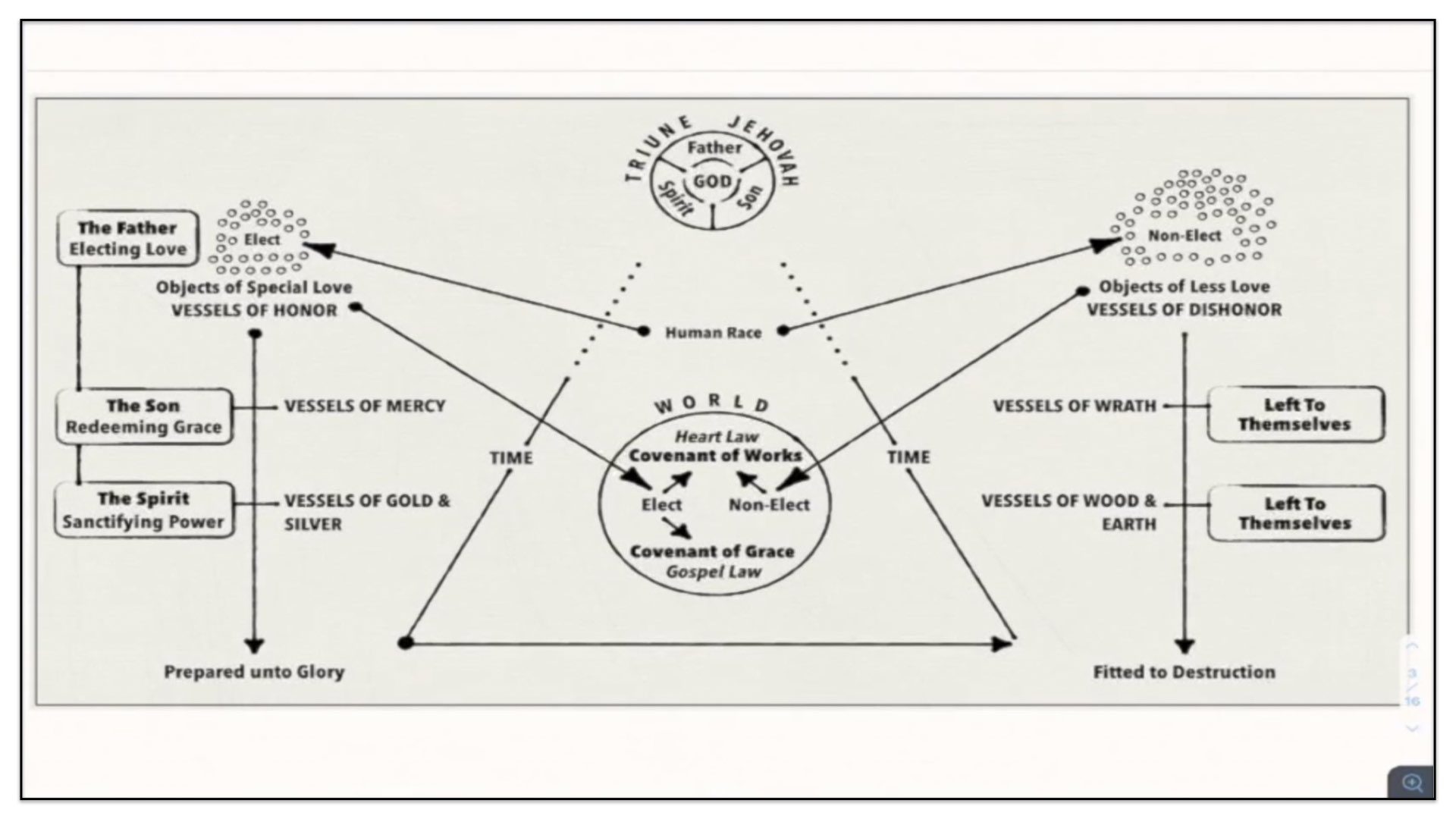
Now you will have noticed, I passed by a timeline here. The outline of my view on the arrangement of the covenants,
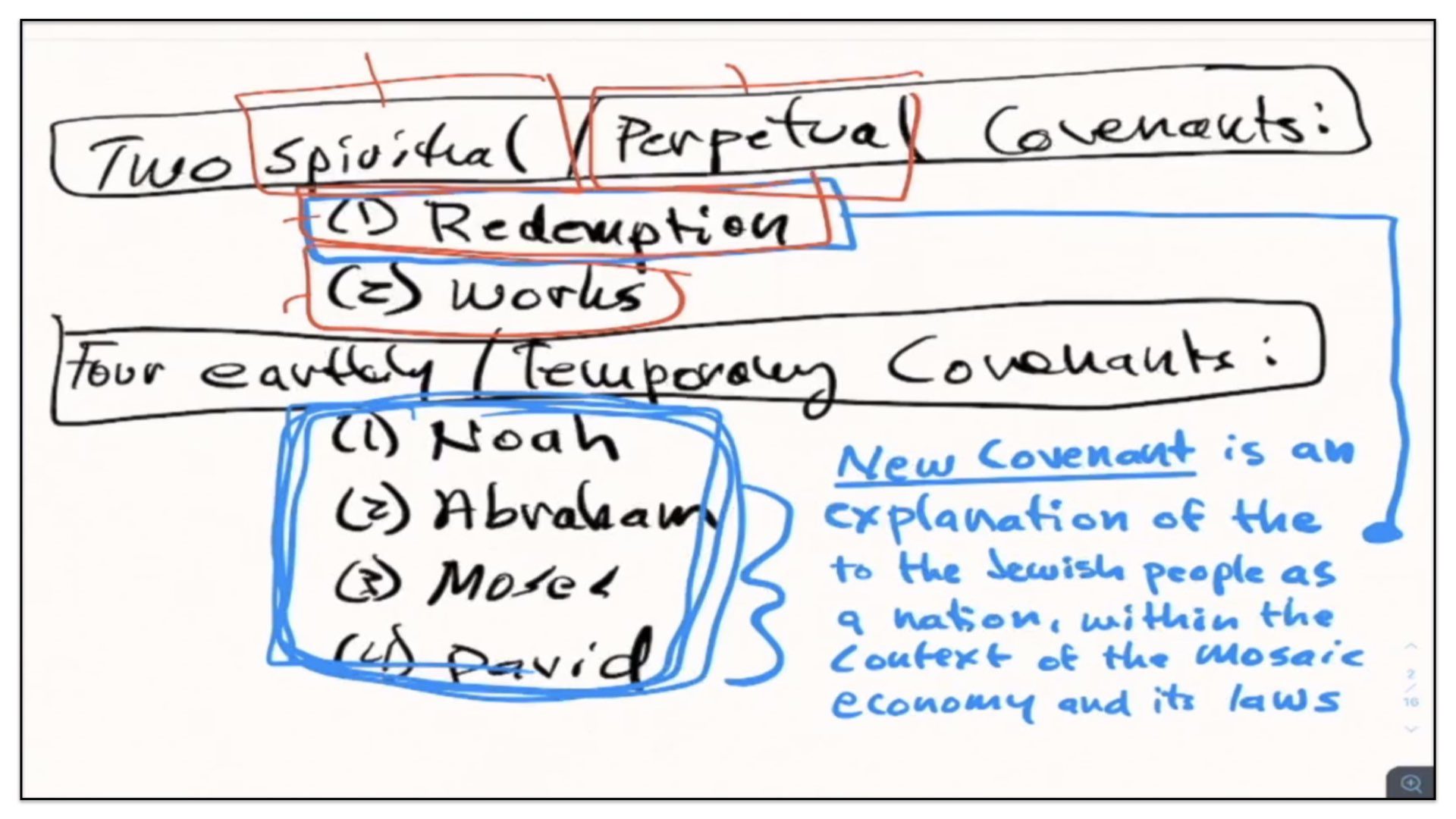
I have also placed in a diagram on a timeline when I gave to you our the previous studies. And I’ll be referring to this timeline in just a few moments.
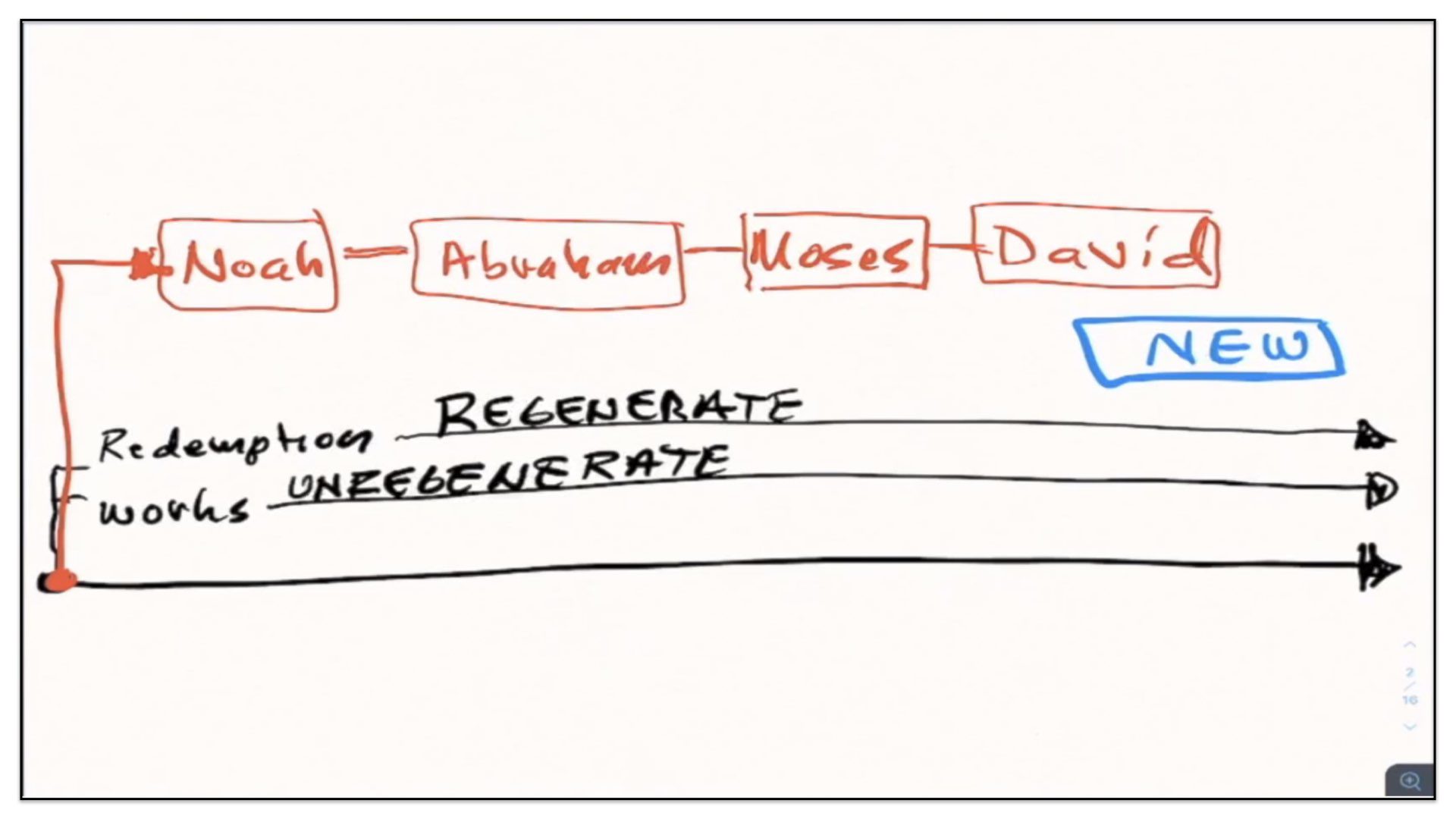
But I’m going to skip the timeline for now, and I’m going to refer you to the Framework of Sovereign Grace. Let me try to give you a little snippet of explanation on how the two perpetual covenants fit together, what they mean.
The Electing Love Of God The Father
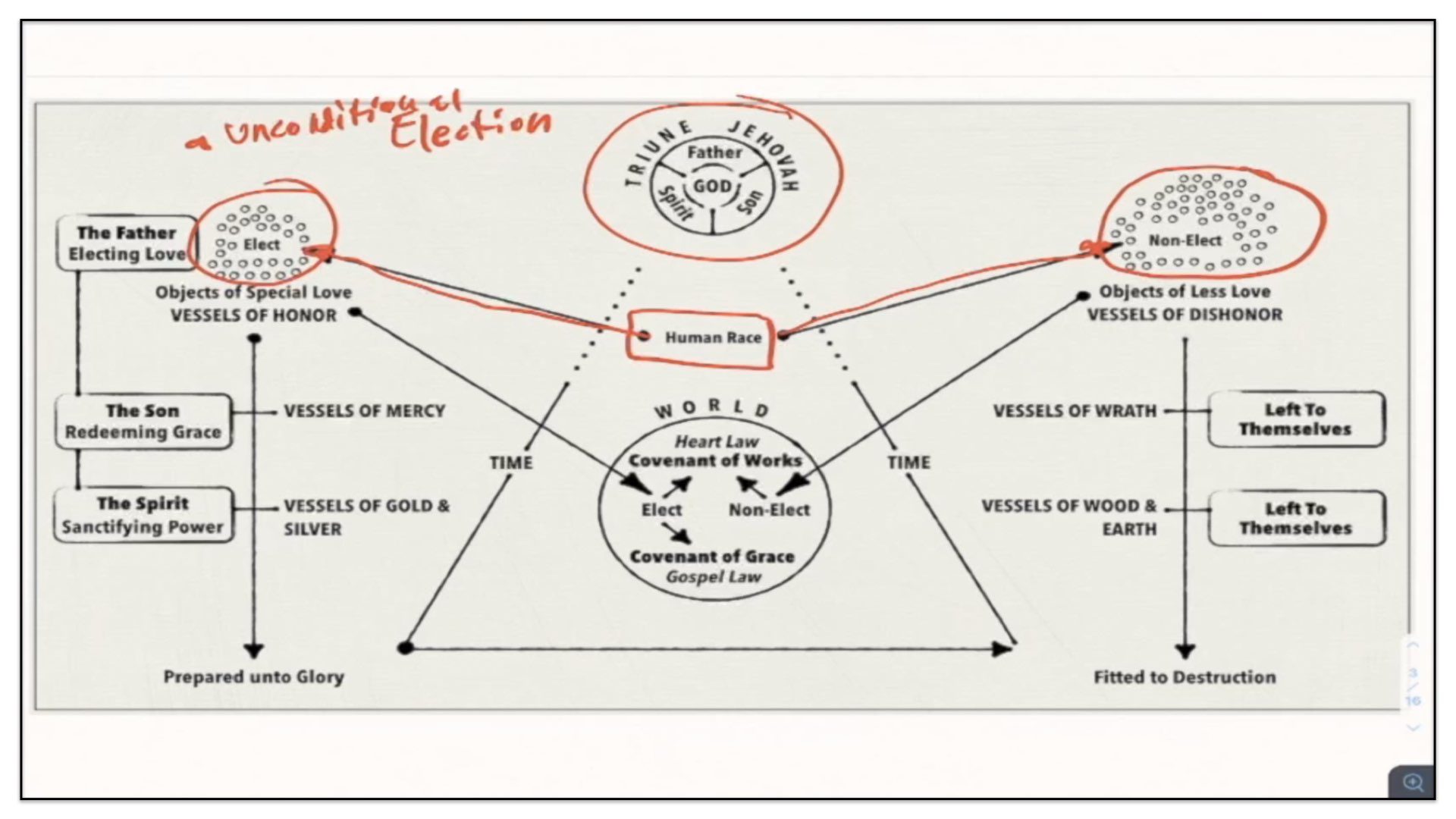
We begin with the Triune Jehovah and God’s master plan for the ages, beginning with Him. From eternity, the Triune Jehovah drew up a blueprint for all that He would accomplish in time and creation. This blueprint is sometimes called His decree, or His purpose, or the determinate counsel of His will. Whatever you like to call it, we’re talking about the plan that God drew up from eternity, before He even called into existence creation or He set in motion the wheels of time. So we’re just looking at a blueprint for now. The blueprint begins with God the Father, envisioning the entire mass of the human race, without viewing them in sin. And then setting apart some from the human race as objects of His special love—they’re called His elect people. And then setting aside the others of the human race as objects of less love—the non-elect or the reprobate. Now, what I’ve just pointed out to you often goes by the name of Unconditional Election—the doctrine of Unconditional Election. That’s what I mean by Unconditional Election, what I’ve just explained to you.
The Creation Of The World And The Time Continuum
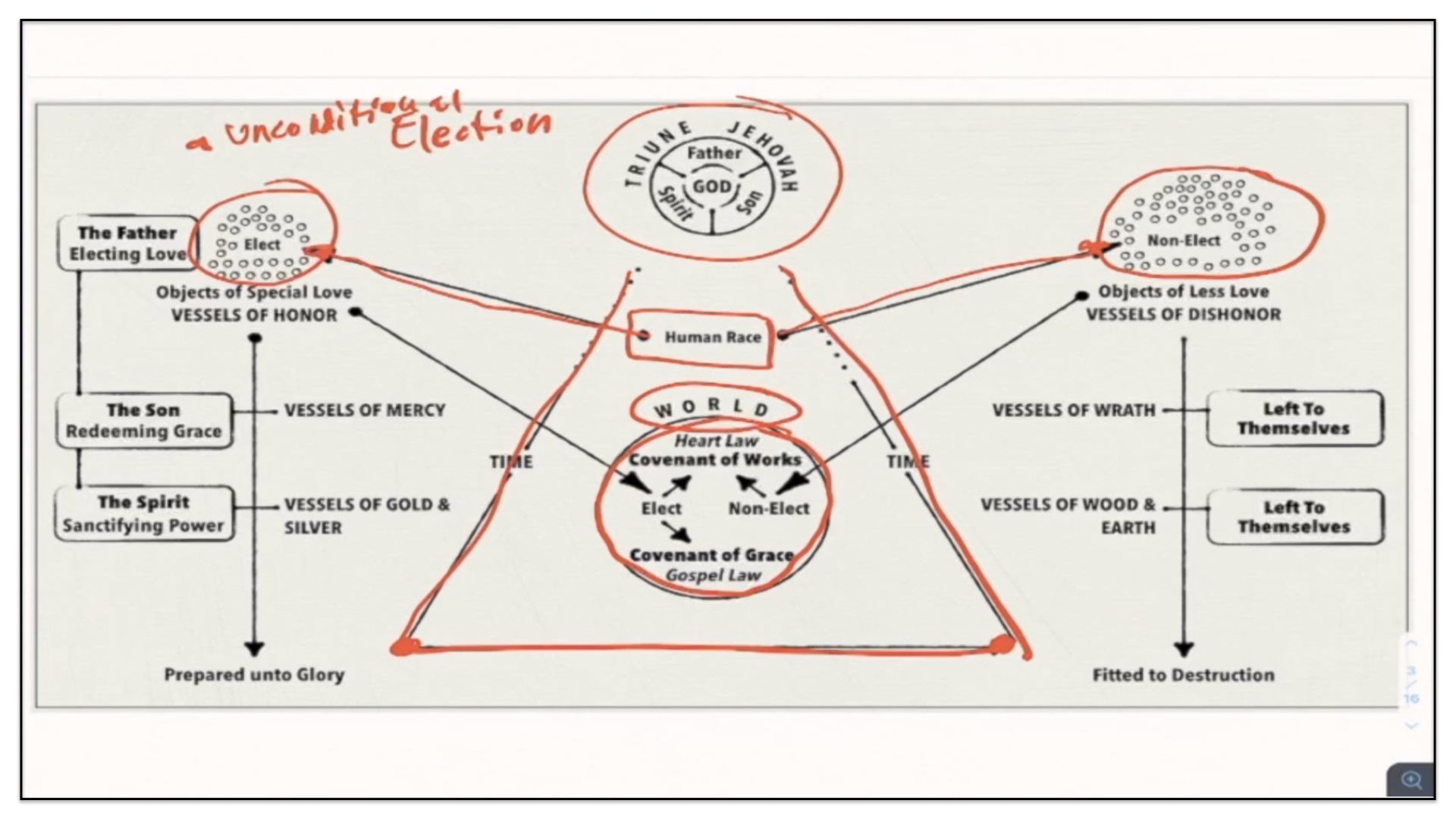
Well, the Father having determined the different groups from the human race, then decided how He would bring the human race into existence. He would do so by bringing them into a time continuum and into a specially made world.
The Authority By Which The Human Race Would Be Put Into Relationship With God—A Covenant Of Works
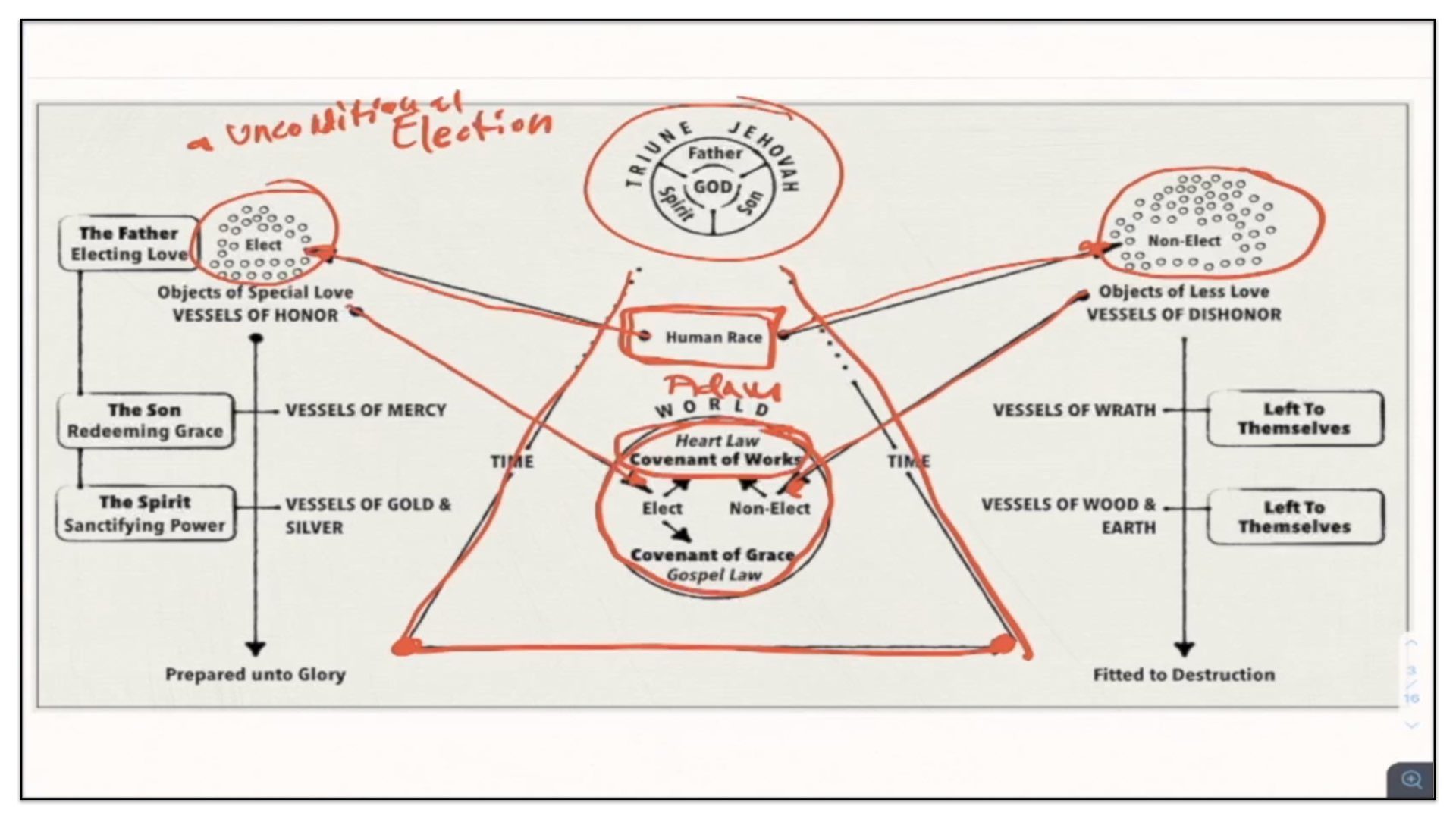
The Father then chose to authorize the human race to be in relationship with Him. And of course, think back to our previous studies. Upon what basis does one have a relationship with another? It’s always on the basis of a covenant—an agreement between two or more people, with certain obligations binding them together. And so it pleased the Father to establish a covenant with the first man, Adam—a covenant that’s called the Covenant of Works. And God appointed Adam to serve as the covenant head for the entire human race—the elect and the non-elect alike. And God required of Adam, under the Covenant of Works, to perfectly obey that law inscribed upon his heart. All of this is part of God’s plan.
The Fall Of Adam And Its Ramifications Upon The Human Race
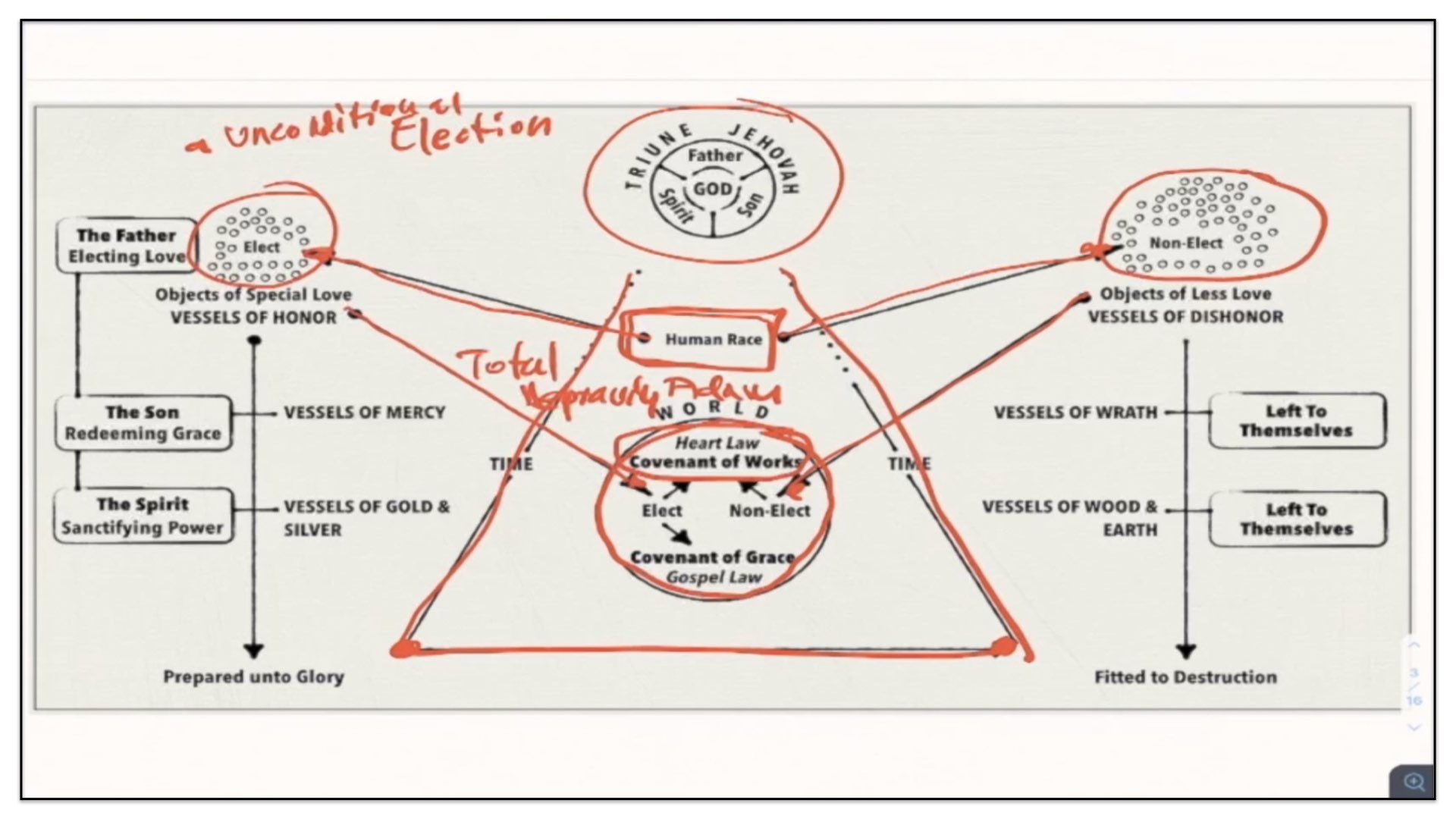
And the Father forthwith decreed within this plan that Adam would transgress the law inscribed upon his heart, thereby violating the terms of the Covenant of Works, and in consequence of which, not only would sin and death and judgment fall upon Adam himself, but also on all of Adam’s posterity—they too would be in sin. They would be conceived in sin and shaped an iniquity. And you see, what I’ve just explained to you here is what we call the doctrine of Total Depravity.
The Reprobation Of The Non-Elect
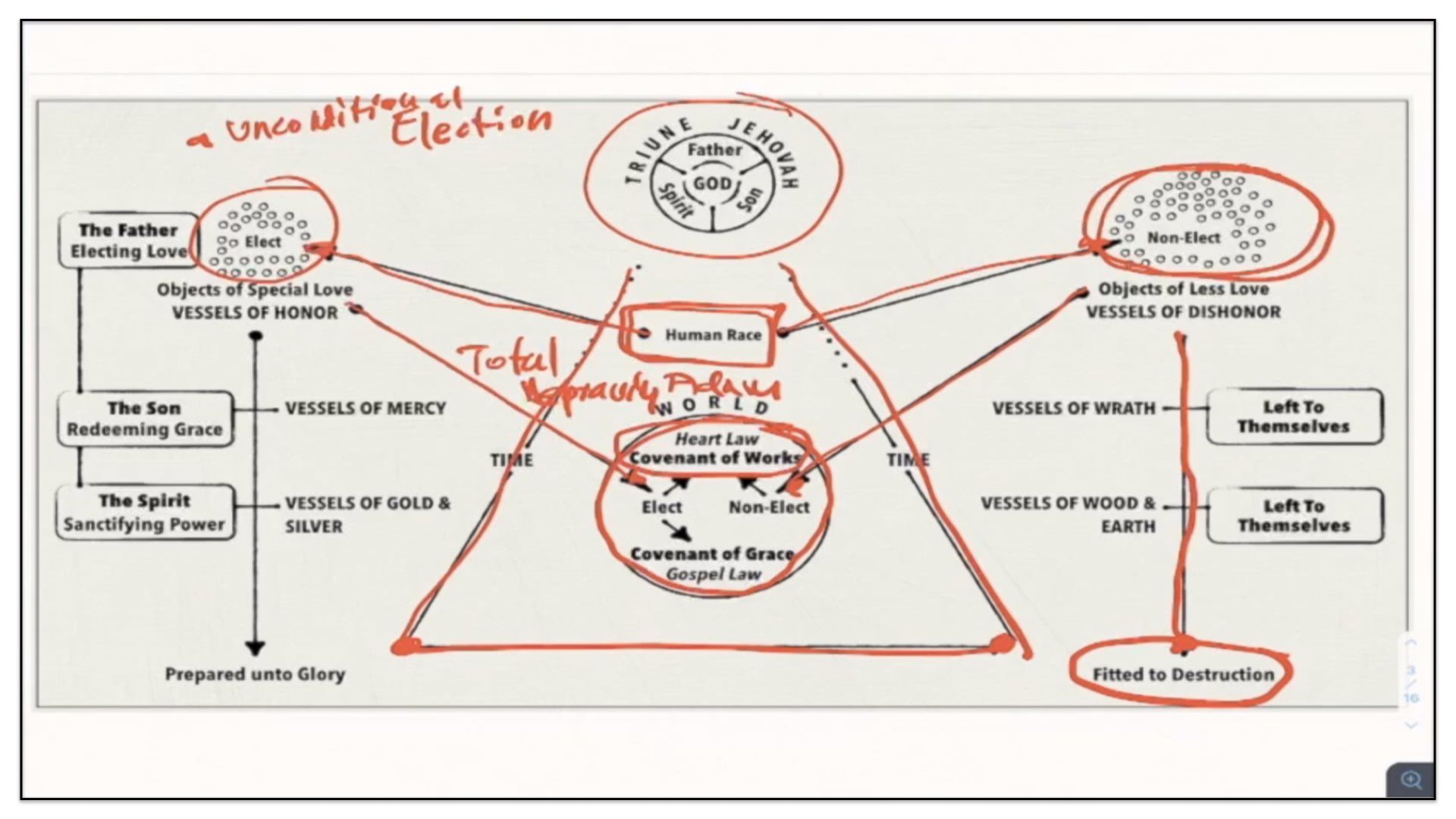
Now watch. Now that the Father has made this determination within His plan, it pleased Him—watch this—to leave the non-elect in their sins, fitting them to destruction. No plan of salvation being made for them.
The Salvation Of The Elect
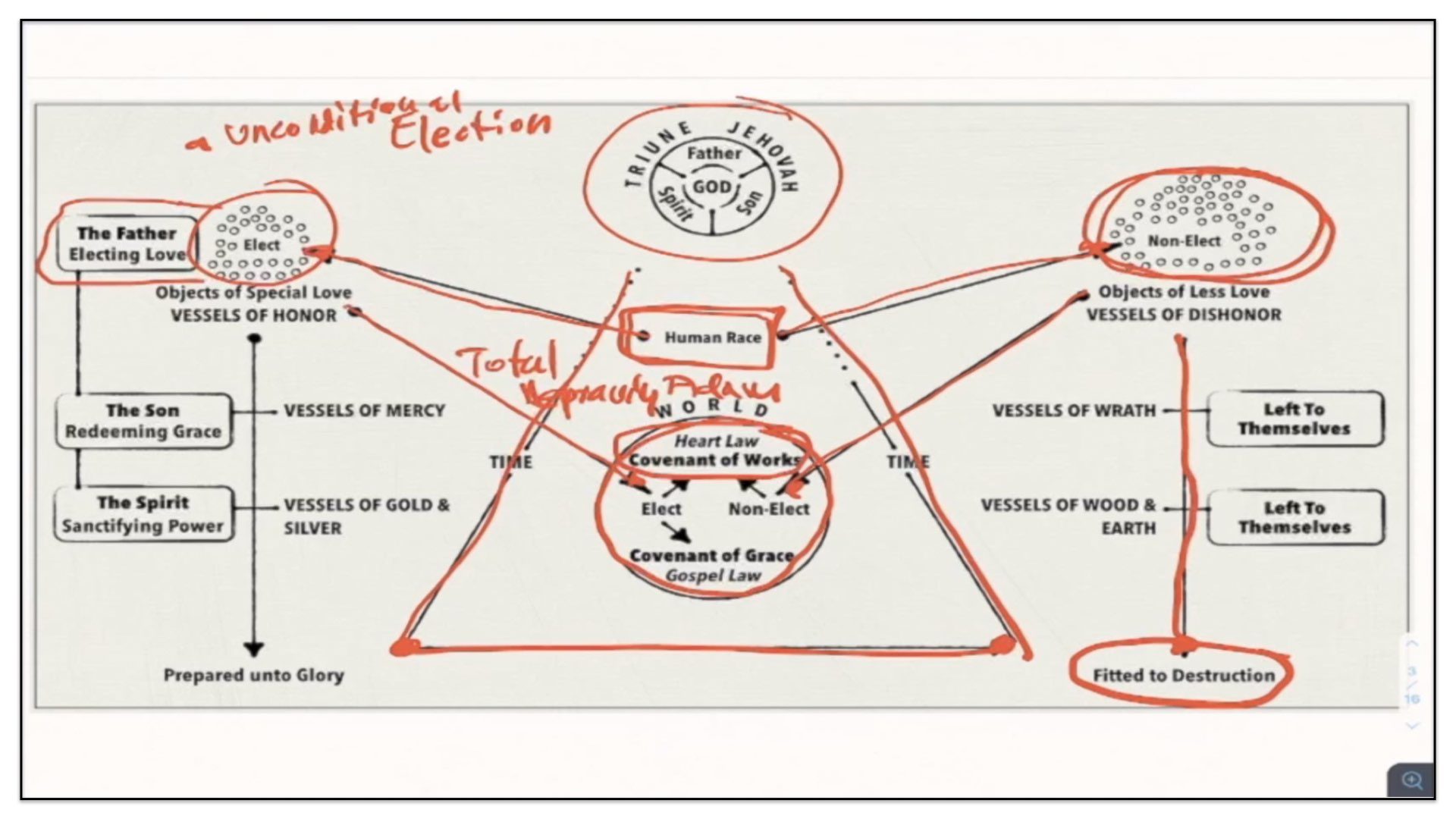
However, and watch this carefully—because the Father had already set His eternal love upon the elect, the Father obligated Himself to them. He loves them with an everlasting love. He will not allow them to perish in sin. So, the Father devised a plan of salvation for His elect people.
The Redeeming Grace Of God The Son
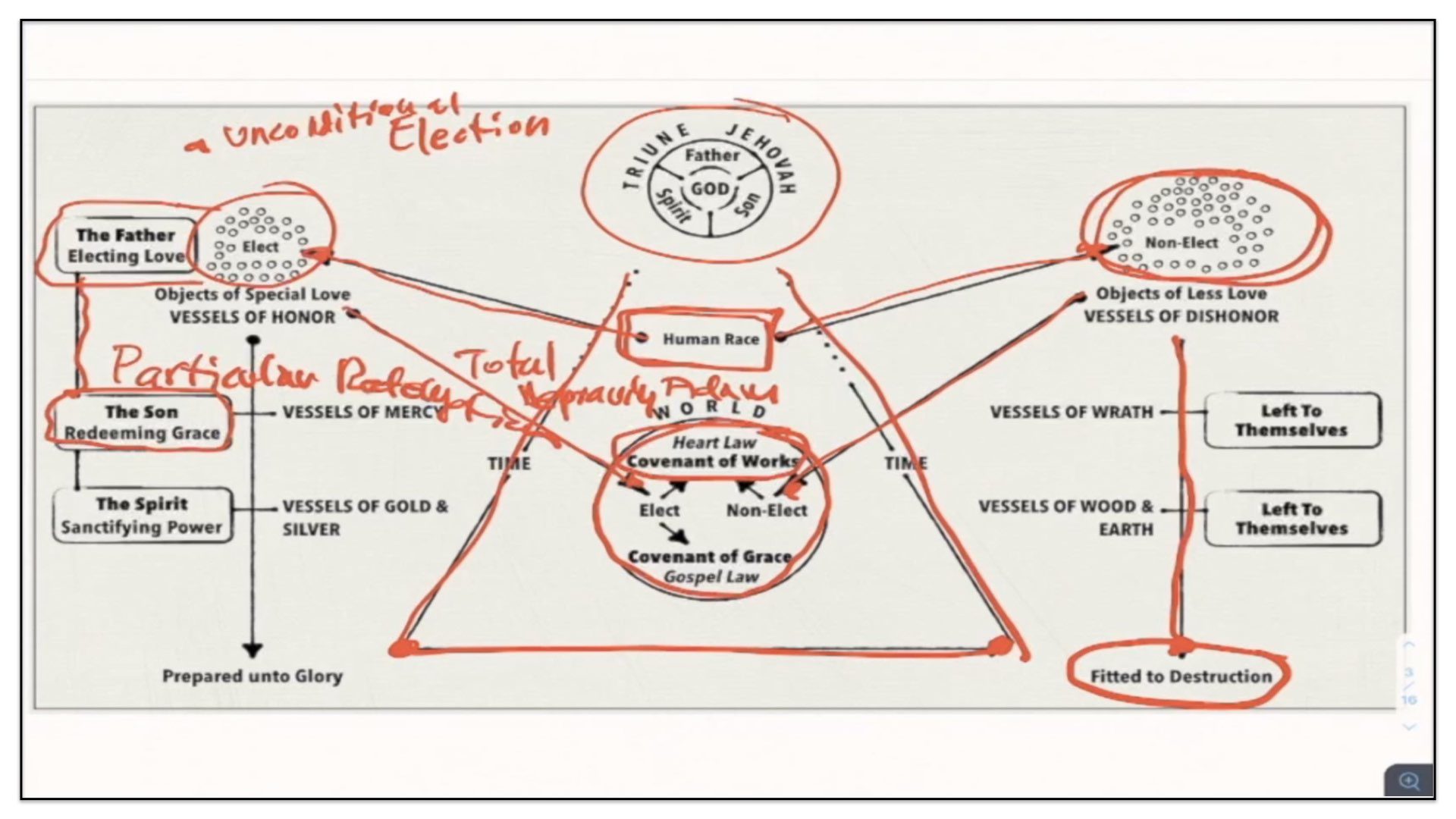
First, the Father gave the elect to His Son, appointing His Son to serve as the Redeemer for these elect sinners. The Son of God received the elect unto Himself and He set His eternal love upon them, and He agreed to serve as their Redeemer. And therefore what I just explained to you is what we call the doctrine of Particular Redemption.
The Twofold Problem Of Sin And God The Father’s Plan To Solve Them
But God’s plan of salvation is not yet finished. For not only must the Father resolve the problem of judicial condemnation, which the Father does by freely justifying His people through the redemption that’s in Christ Jesus, but also the Father must solve the problem of spiritual corruption. The soul itself is corrupted by sin and is actually dead in trespasses and sins. How can the soul be made alive unto God and how can the soul be renewed, or a new nature be imparted to it?
The Sanctifying Power Of God The Spirit
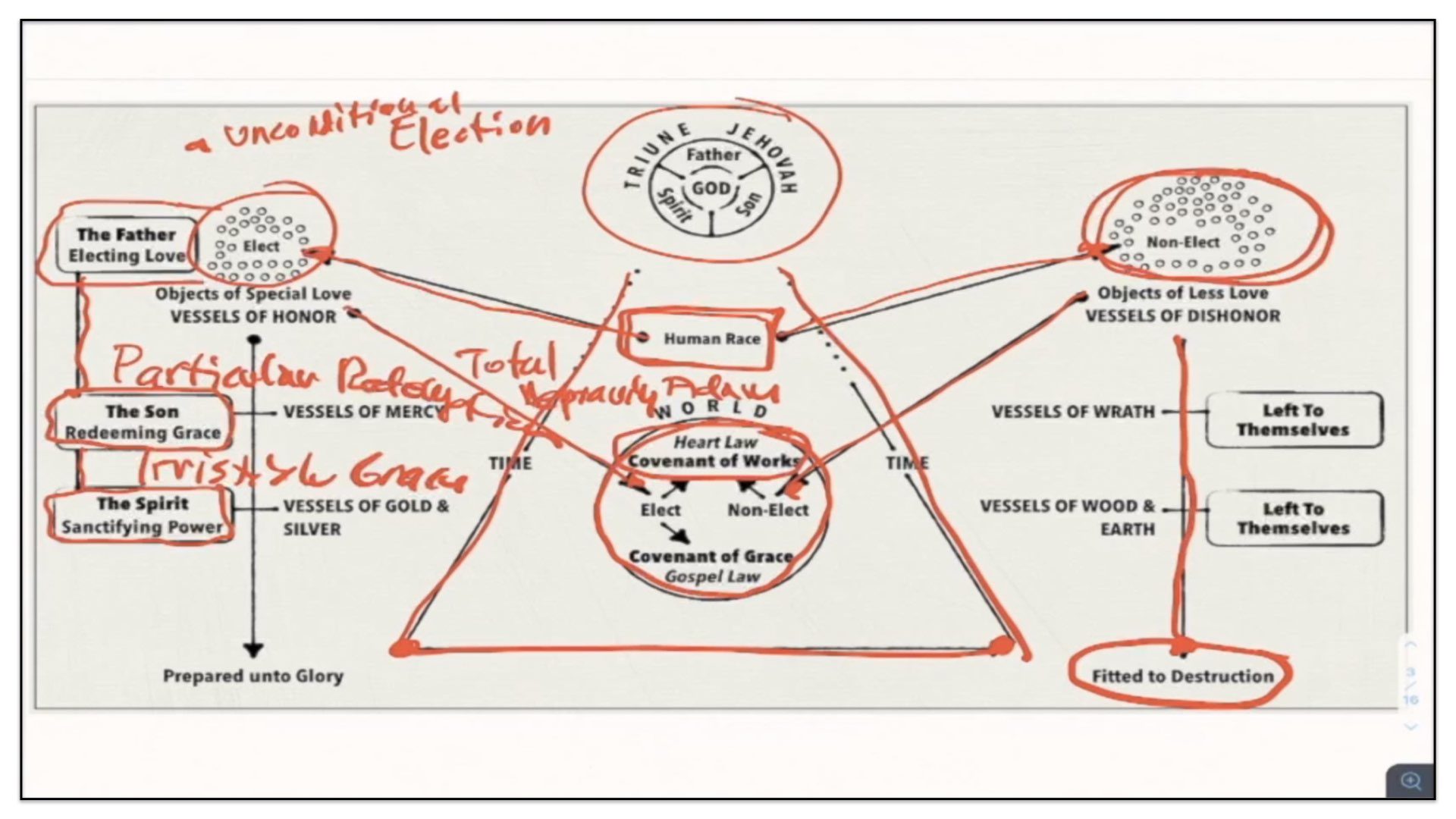
Well, this is the work of God the Spirit. The Father and Son gave the elect to the Spirit and appointed Him to serve as their Sanctifier. The Spirit of God received the elect unto Himself and set His everlasting love upon them and He agreed to sanctify them by regenerating their souls according to His sovereign power. And you see, this is what we often call the doctrine of Irresistible Grace.
The Doctrines Of Grace—A Covenant Of Redemption Between The Father, Son and Holy Spirit
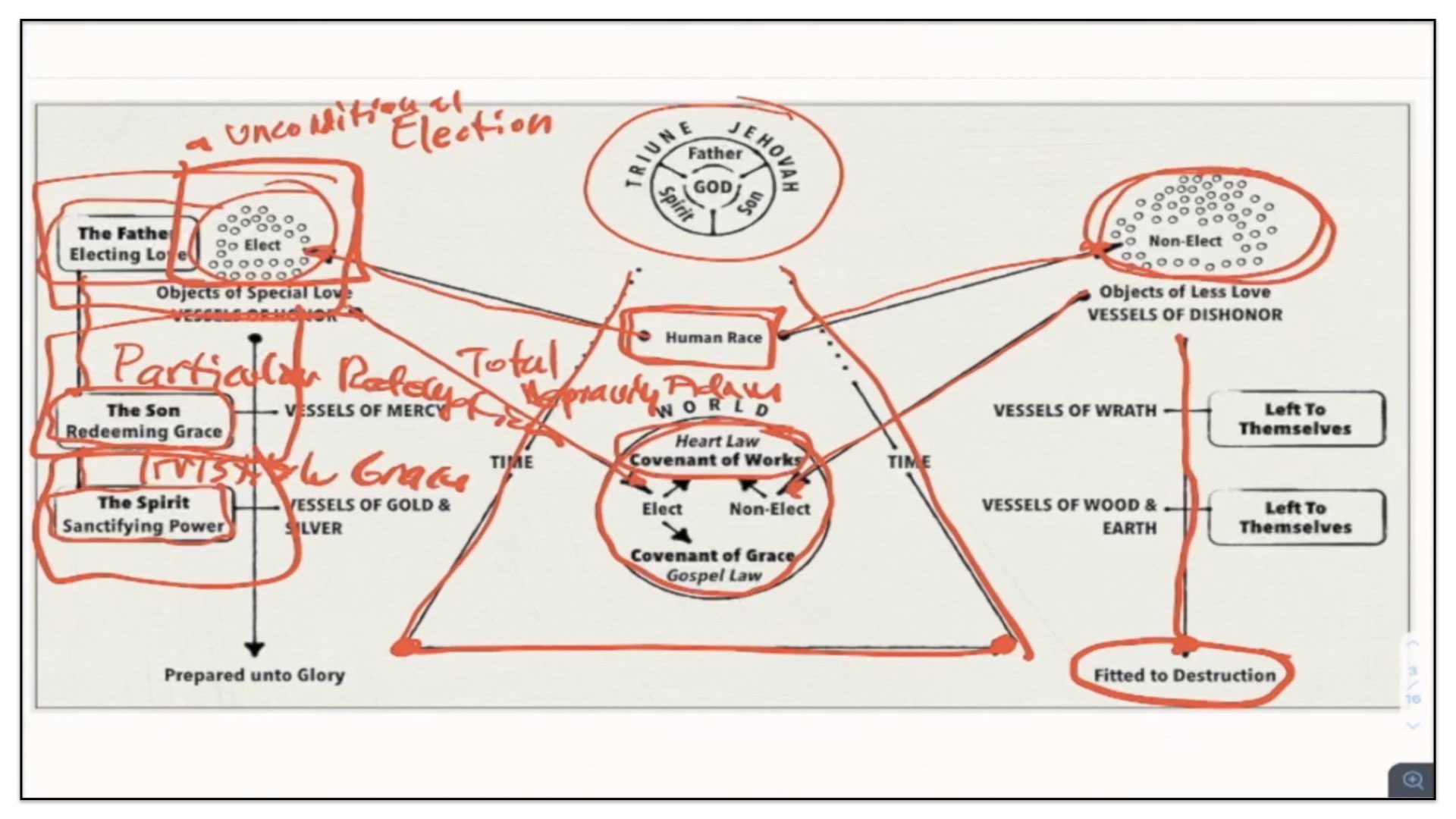
Now, what I’m presenting to you are what’s called the Doctrines of Grace, or the Five Points of Calvinism. It’s in this way, as I just explained, that God the Father has solved the problem of a sinner’s judicial condemnation. As I’ve said, by freely justifying His elect people by the redemption that’s in Christ Jesus, and also solving the problem of a sinner’s spiritual corruption by fully sanctifying His elect people at the appointed time in history by the regenerating power of the Holy Spirit. And you see, my dear friends, this is an agreement between the Father the Son and the Holy Spirit on behalf of Their elect people, to save them from their sins.
Different Names Given For The Covenant Of Redemption
The Everlasting Covenant
This agreement is what the scripture sometimes call the everlasting covenant, as I’ve read for you in the previous scriptures. And it’s called the everlasting covenant because it is an agreement made between the three Persons of the Godhead from eternity, and because it is an agreement that has no end. It is truly everlasting.
The Covenant Of Peace
This agreement is also called the covenant of peace, because by it God the Father makes peace between Himself and the sinner, according to the redeeming work of Christ and the sanctifying work of the Holy Spirit.
The Covenant Of Redemption
This agreement is also sometimes called the Covenant of Redemption, for in it, the Father has appointed His Son to serve as the Redeemer for His elect people, and the Son agreed to serve in that capacity.
The Covenant Of Grace
Now, I usually call this agreement the Covenant of Grace. I call it the Covenant of Grace, which you see here on the diagram, on the Framework of Sovereign Grace, because the God of all grace is the one who has drawn up this agreement, magnifying His grace, His favor and good will towards His elect people unto salvation.
The Error Of Distinguishing Between A Covenant Of Redemption From Eternity And A Covenant Of Grace In Time
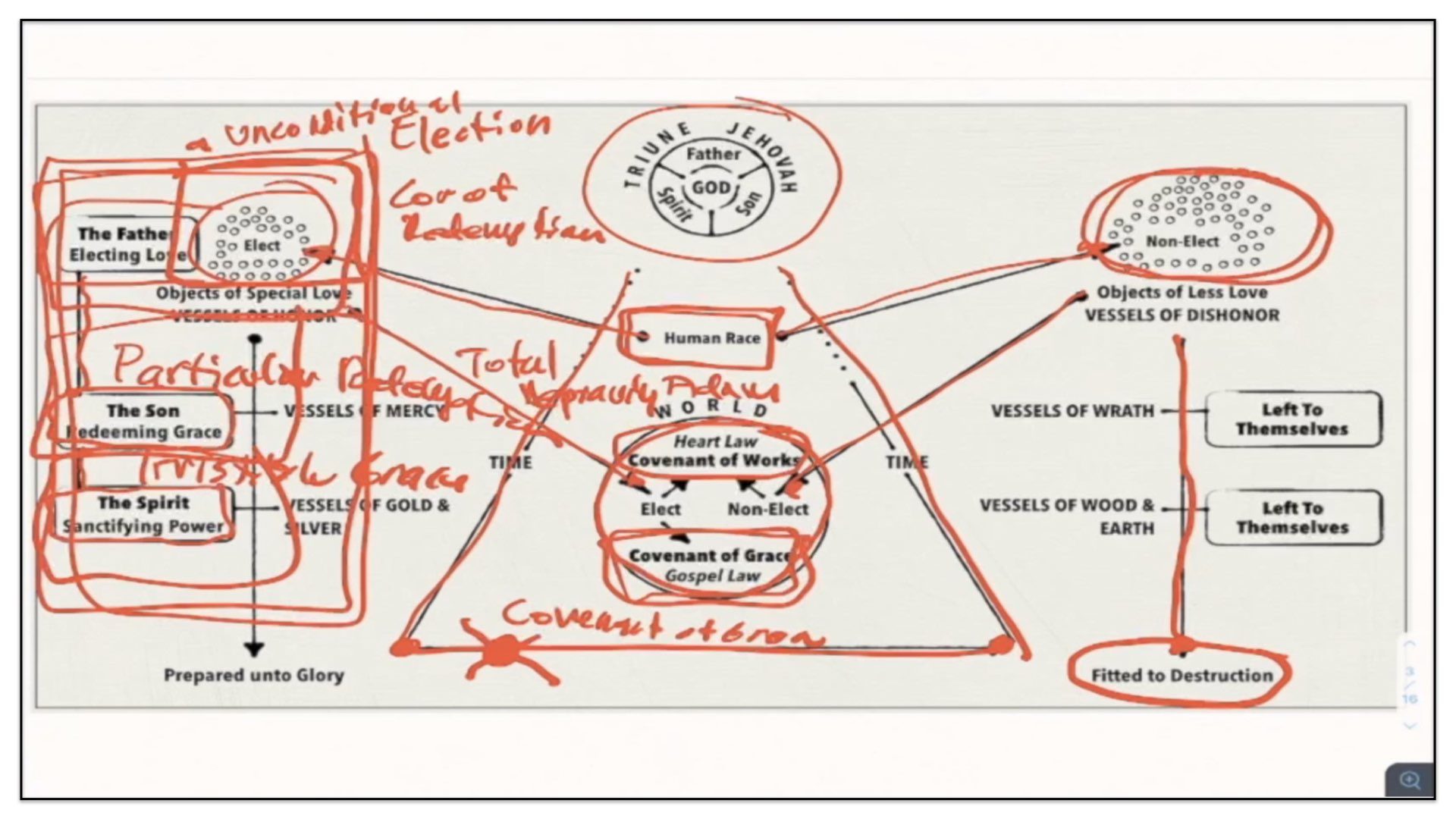
Now, please listen to me. When I use the label Covenant of Grace as I’ve now explained it to you, I am not referring to that conditional Covenant of Grace intended by the Presbyterians and the Reformed Baptists. Remember from our previous studies, I’ve explained it to you, the Presbyterians and Reformed Baptists believe that aside from this everlasting covenant or this Covenant of Redemption, they believe that God has also established in time another covenant they call a Covenant of Grace. And they therefore distinguish between a Covenant of Grace God makes in time with sinners, and the Covenant of Redemption God makes from eternity between the three Persons of the Godhead. They make that distinction. And what I’m trying to say to you—I do not believe that there is an additional Covenant of Grace where God imposes upon the sinner saving faith in Christ in order to be saved. Now, because this is such a prominent view and it’s so confusing because most of the sovereign grace preachers today are the Presbyterians and the Reformed Baptists, and therefore, if you’re going to get any substance in the teachings, you often turn to those preachers to feed you. And that’s what’s so confusing—they’ll be using the same language I use, but they’ll be meaning very different things by it. And for this reason, I selected some quotations to read for you on this point, so that you can be clear exactly what it is the Presbyterians and Reformed Baptists believe, compared to what it is I believe and I’m setting out for you in these teachings. This is a very useful thing. So I hope you’re going to stay tuned—don’t be distracted; don’t lose interest—and I’m going to read to you these statements.
The 1646 Westminster Confession Is At Fault On This Matter
The first of these statements that I’ve selected is the 1646 Westminster Confession of Faith. This is the seventh article and the second and third paragraphs. Now, this is the official statement for the Presbyterians. Let me begin reading for you from the quote: “The first covenant made with man was a covenant of works, wherein life was promised to Adam, and in him to his posterity, upon condition of perfect and personal obedience. Man by his fall having made himself incapable of life by that covenant, the Lord was pleased to make a second, commonly called the Covenant of Grace:”—So, apart from a Covenant of Redemption, which is not referred to at this point, there is a Covenant of Works and then a Covenant of Grace made with Adam after he sinned. Watch this—“whereby he freely offereth”—the free offer of the Gospel—“unto sinners life and salvation by Jesus Christ, requiring of them faith in him,”—that’s duty-faith. I’ll just write this down so you can see the meaning of the language. This is what’s called the free offer of the gospel, requiring of them, this is what’s called duty-faith, requiring of them faith in Christ—“that they may be saved;”—see, that’s a conditional Covenant of Grace where God imposes faith as a condition for salvation—“and promising to give unto all those that are ordained unto life his Holy Spirit, to make them willing and able to believe.”—a very weak statement on regeneration, if even that statement is what regeneration refers to. It almost seems as if, before the Spirit regenerates the soul, the Spirit of God is preparing the soul prior to regeneration, making them willing and able to believe. I’m not sure that’s their intention, but the language is ambiguous and loose. But the main point of this—they believe in two covenants aside from the Covenant of Redemption, and the second of these covenants is a conditional Covenant of Grace. That’s the position of the Presbyterians, you see.
The 1689 Baptist Confession Is At Fault On This Matter
Now, the second quote I’m going to read for you is from the 1689 London Baptist Confession of Faith. It’s also the seventh article and this is the second paragraph. Now, this is the official statement of the Reformed Baptists: “Man having brought himself under the curse of the Law by his fall, it pleased the Lord to make a Covenant of Grace wherein he freely offereth”—there is the free offer—“unto Sinners, Life and Salvation by Jesus Christ, requiring of them”—there’s duty-faith—“Faith in him, that they may be saved; and promising to give unto all those that are ordained unto eternal Life, his holy Spirit, to make them willing, and able to believe.” You see the language is almost identical to that of the 1646 Westminster Confession of Faith. It sets out a conditional Covenant of Grace along with the free offer of the gospel and duty-faith of the sinner.
The Presbyterians And Reformed Baptists Are Self-Acclaimed Confessionalists
Now, I should point out to you that the Presbyterians and Reformed Baptists, both groups, are self-acclaimed Confessionalists. What that means, these groups believe that their respective statement of faiths, confessional statements, are a perfect articulation of the faith once delivered unto the saints. Sure, they don’t think it’s infallible, but as close to perfection as you can humanly get. They tend to believe that these are excellent expressions which identify the historic faith of both the Presbyterians or the Particular Baptists—a historic statement of reformed theology. Alright, well, there’s the position as I’ve tried to state to you on these two groups—a conditional Covenant of Grace, something I don’t agree with.
Benjamin Keach Denounced This Distinction As A Grave Error
I would like to say to you—because I’m going to read now a third quote—that not everyone who signed the 1689 London Baptist Confession of Faith agreed with this point. Now, isn’t that surprising? In fact, one of the most popular Particular Baptist preachers of that time, and the man who put his name, his signature, to this Confession of Faith, was Benjamin Keach. And Benjamin Keach, three years after signing his name to this confession, denounces the very teachings of this article. Isn’t that fascinating? I’m going to read for you a quote taken from a sermon that Keach preached in 1692. So, three years after the 1689 had been ratified, or signed by these Baptist ministers. And listen now to what Keach has to say on the subject of a conditional Covenant of Grace. He says:
“Question:—Is not that covenant which was made between the Father and the Son called the Covenant of Redemption made from all eternity a distinct covenant from the Covenant of Grace?” In other words, are there not two covenants—a Covenant of Redemption from eternity and a covenant between God and the sinner made in time?
Keach answer, “I must confess, I have formally been inclined to believe the covenant or holy compact between the Father and the Son was distinct from the Covenant of Grace, but upon further search, by means of some great errors sprung up among us, arising as I can see, from that notion, I cannot see that they are too distinct covenants, but both one and the same glorious Covenant of Grace. Where do we read and all the Holy Scripture of three covenants—a Covenant of Works, a Covenant of Redemption, a Covenant of Grace? Evident it is too all that the Holy Spirit only holds forth or speaks, but of two covenants—a Covenant of Works and a Covenant of Grace,” or Redemption.
Now, just think of that for a moment. The 1689 Baptist Confession is held up by all Reformed Baptists as the perfect specimen or articulation of the faith once delivered unto the saints. And they pride themselves that the leading Particular Baptist pastors of that day put their names to that document. “There it is,” they say, “all these leading Particular Baptist pastors and the 17th century signed their names to the 1689 confession…the statements in this confession is the consensus of the historic Baptists.” But, my dear friends, it’s not that simple. Keach signed his name to the 1689 Baptist Confession, and then three years later preached a couple of sermons denouncing the covenantal framework of this seventh article. Keach acknowledged that at one time he did believe there was a conditional Covenant of Grace, but later in his ministry, he changed his view.
Now, my question is, exactly when did he change his view? Was it after he signed the 1689 Baptist Confession of Faith? Or was it before he signed the confession of faith? Either way, it certainly diminishes the Reformed Baptists’ belief that the 1689 Confession is a perfect articulation of the faith once delivered unto the saints. Especially since men such as a Keach, although signing their names to it, did not actually subscribe entirely to it. And you want to know what’s more—I’ve met a lot of Reformed Baptists and when we start discussing the minute details of the 1689, many times they’ll say to me, “Well, I agree with the 1689 in general, but not every detail of the document.” I’d like to say the same was true for those that put their name to it in 1689—they probably agreed to it in general, but they had a fair share of problems when it came to some of the details and articles of the statement. I could say more about the 1689, but I want to leave it there, because there’s one final quote I’m going to give to you.
John Gill Agreed With The Testimony And Conclusions Of Benjamin Keach
Around 20 years after Keach died, the man who was appointed to pastor that church—the church Keach was pastoring—was John Gill. Would you be surprised to know that John Gill shared the same view with Keach on the subject of the Covenant of Redemption? I’m going to read for you from John Gill’s “Body of Doctrinal Divinity”, and here is what he has to say on the issue:
“The Covenant of Redemption is the same with the Covenant of Grace; some divines or some theologians indeed make them distinct covenants; the Covenant of Redemption, they say, was made with Christ in eternity; the Covenant of Grace with the elect, or with believers, in time; but this is very wrongly said; there is but one Covenant of Grace and not two; what is called a Covenant of Redemption is a Covenant of Grace; there can be no foundation for such a distinction between a Covenant of Redemption in eternity and a Covenant of Grace in time.”
I Agree With The Testimony And Conclusion Of Keach And Gill
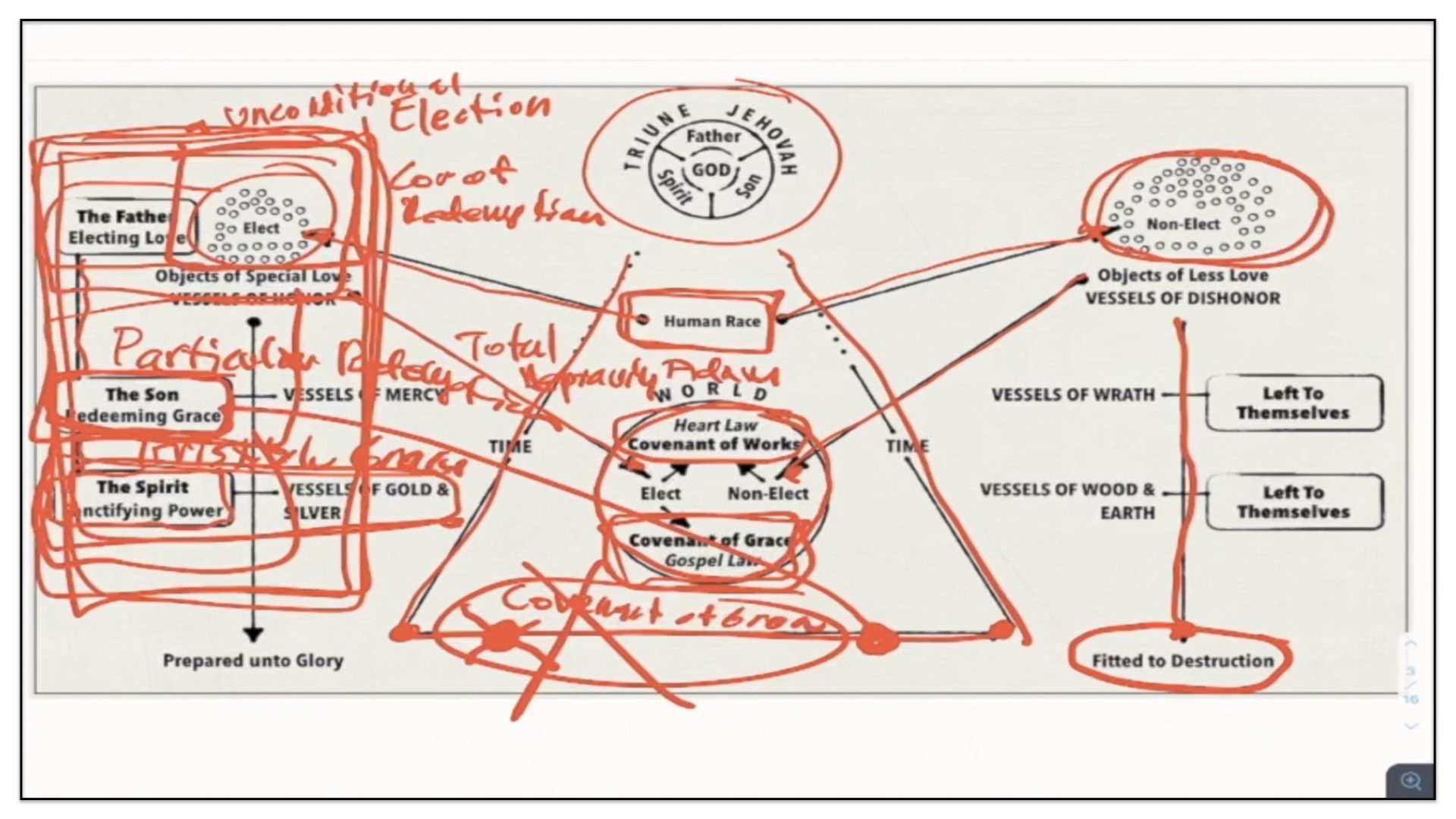
And so, this also is my conclusion. I do not believe the scriptures teach a conditional Covenant of Grace. Rather, the scriptures teach the Covenant of Redemption is one and the same with the Covenant of Grace. It’s not conditioned at all on man’s faith, but rather, on the Spirit of God regenerating the soul, and then imparting the faith of Christ to the soul, by virtue of that soul’s union with Christ. That’s the Covenant of Redemption.
A Side Note—Technically Speaking, Every Covenant Is By Nature Conditional
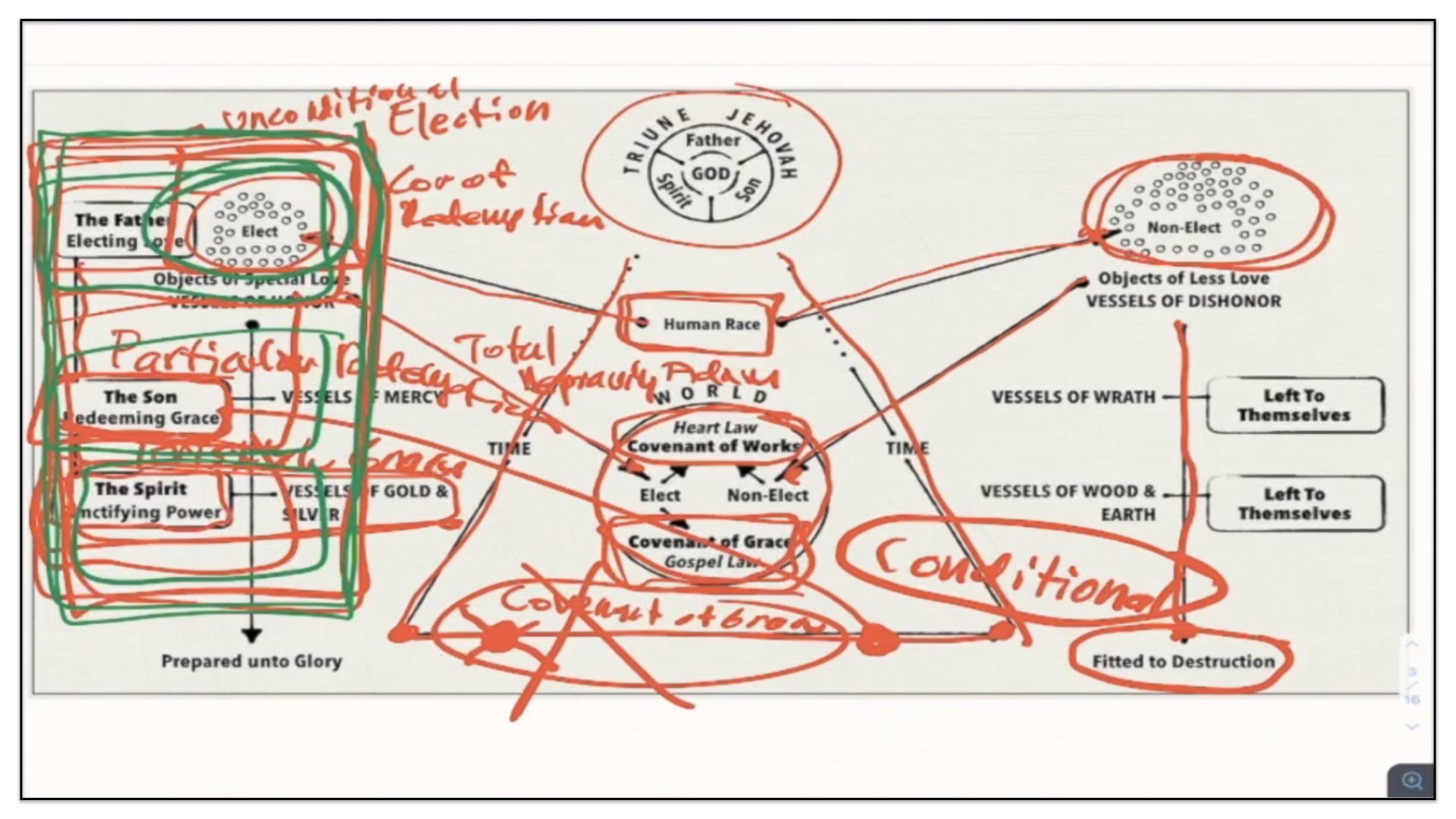
Well, I have to hasten to mention one side note in all of this, because I’m speaking about the Covenant of Grace being conditional or unconditional. Now, please listen to me. Every covenant is conditional. You’ll sometimes hear Bible teachers speak about the difference between a conditional covenant and an unconditional covenant. Technically speaking, there’s no such thing. Every covenant is conditional. Remember, a covenant is an agreement between two or more people with certain obligations binding them together. So, there are obligations or conditions within the agreement. I like you to notice—and I’ll just change the color pen—when it comes to the Covenant of Redemption, or the Covenant of Grace, this covenant is conditioned upon the three Persons of the Godhead. It has no conditions on it whatsoever when it comes to the sinner. But rather, all conditions are agreed to and fulfilled by the Father, Son and Spirit, on behalf of Their elect people. And that’s just a side note to make sure you understand the issues involved when it comes to the the Covenant of Grace as a conditional covenant, but a conditional covenant within the context of the work of the Father, Son and Spirit for their elect people.
An Explanation On Why The Covenants Of Redemption And Works Are Identified As Spiritual And Perpetual
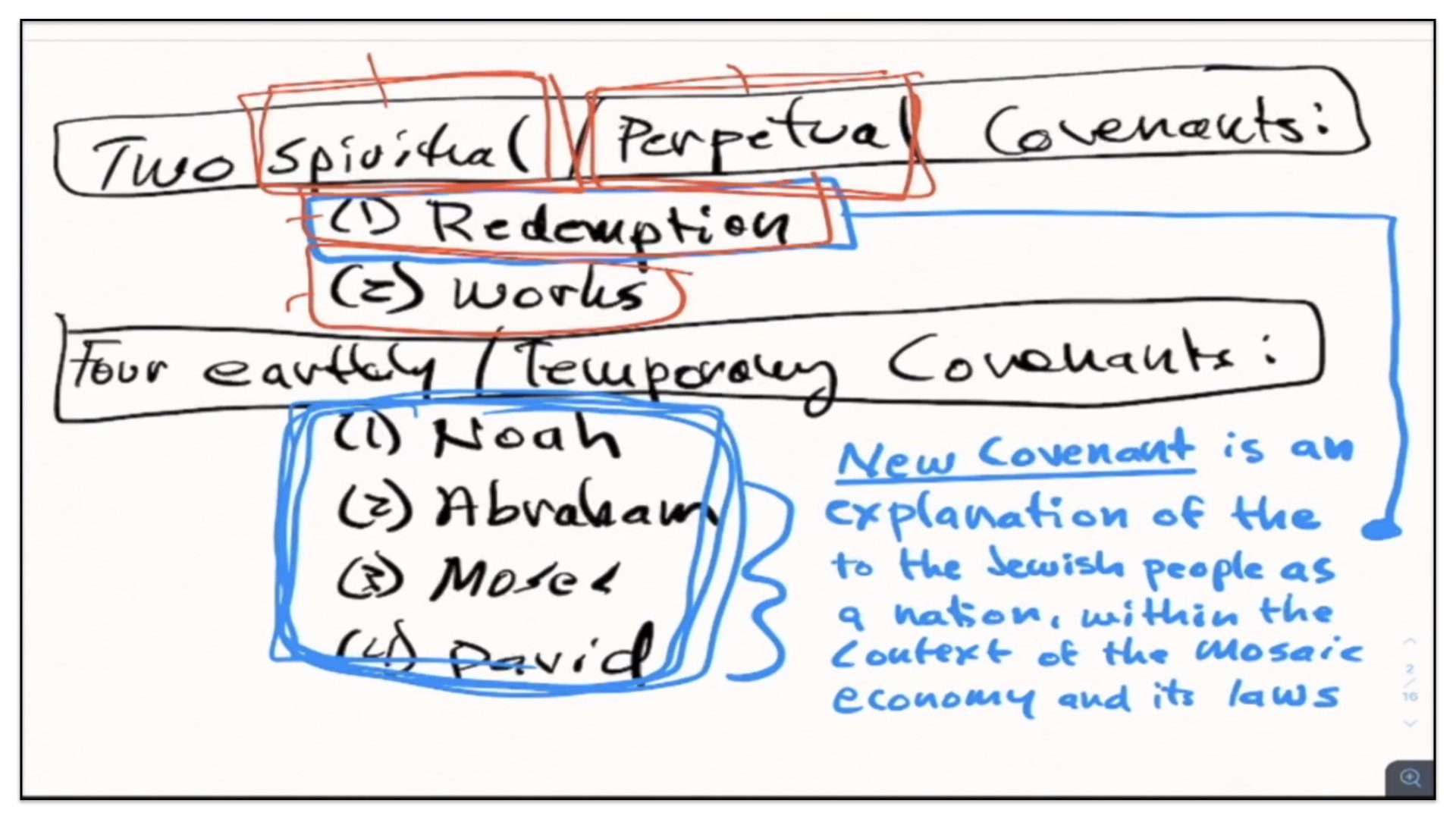
Okay, that’s my overview for you on the meaning and connection of these two covenants. Let me now take you back to the main outline of what we’re talking about. And that is to now discuss the issues of why I say these two covenants are spiritual and perpetual.
They Are Spiritual Covenants
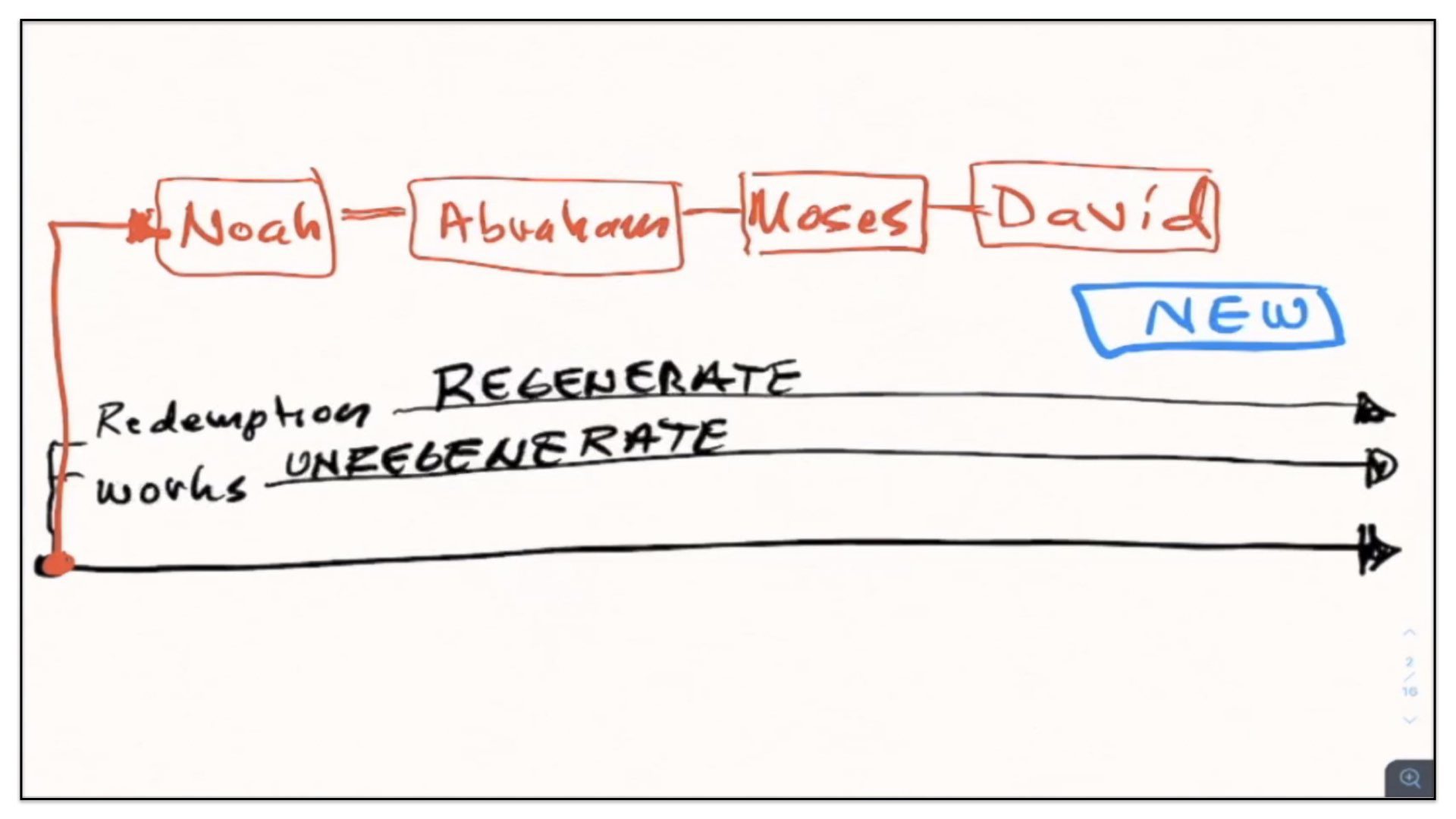
I’m going to first deal with the idea of these two covenants being spiritual covenants. And let me refer you now to the diagram with the timeline. By spiritual, I mean it’s under one or the other of these two covenants that men and women throughout the course of history are in relationship either to God, or with God.
The Entire Human Race, Throughout The Course Of History, Is In Relationship Either TO God Under The Authority Of The Covenant Of Works (In An Unregenerate Condition), Or WITH God Under The Authority Of The Covenant Of Redemption (In A Regenerate Condition)
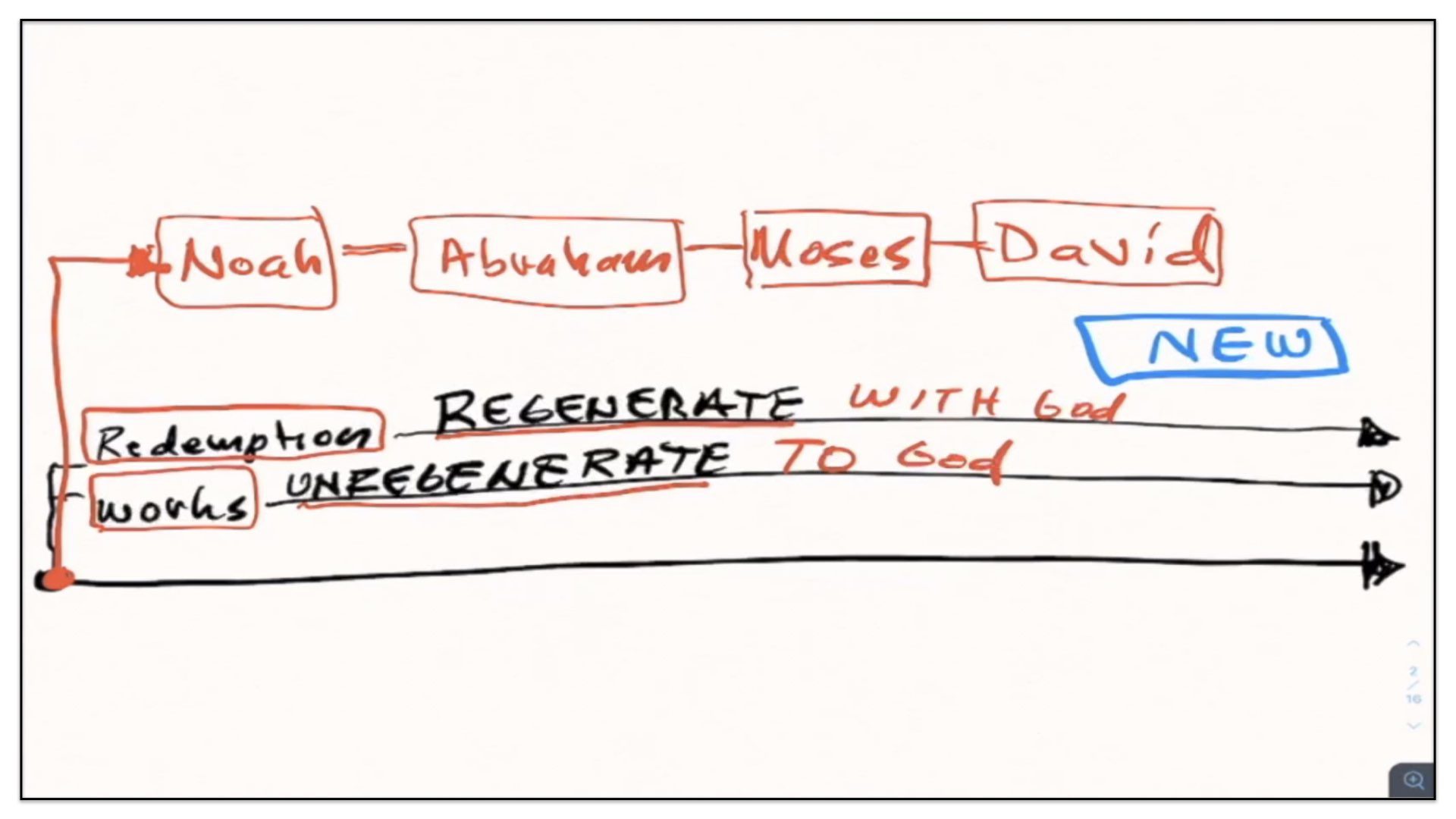
Please listen to me. All unregenerate sinners are under the authority of the Covenant of Works and are therefore in relationship to God; whereas all regenerate sinners are under the authority of the Covenant of redemption and are therefore in relationship with God. Do you see the distinction? It really is that simple?
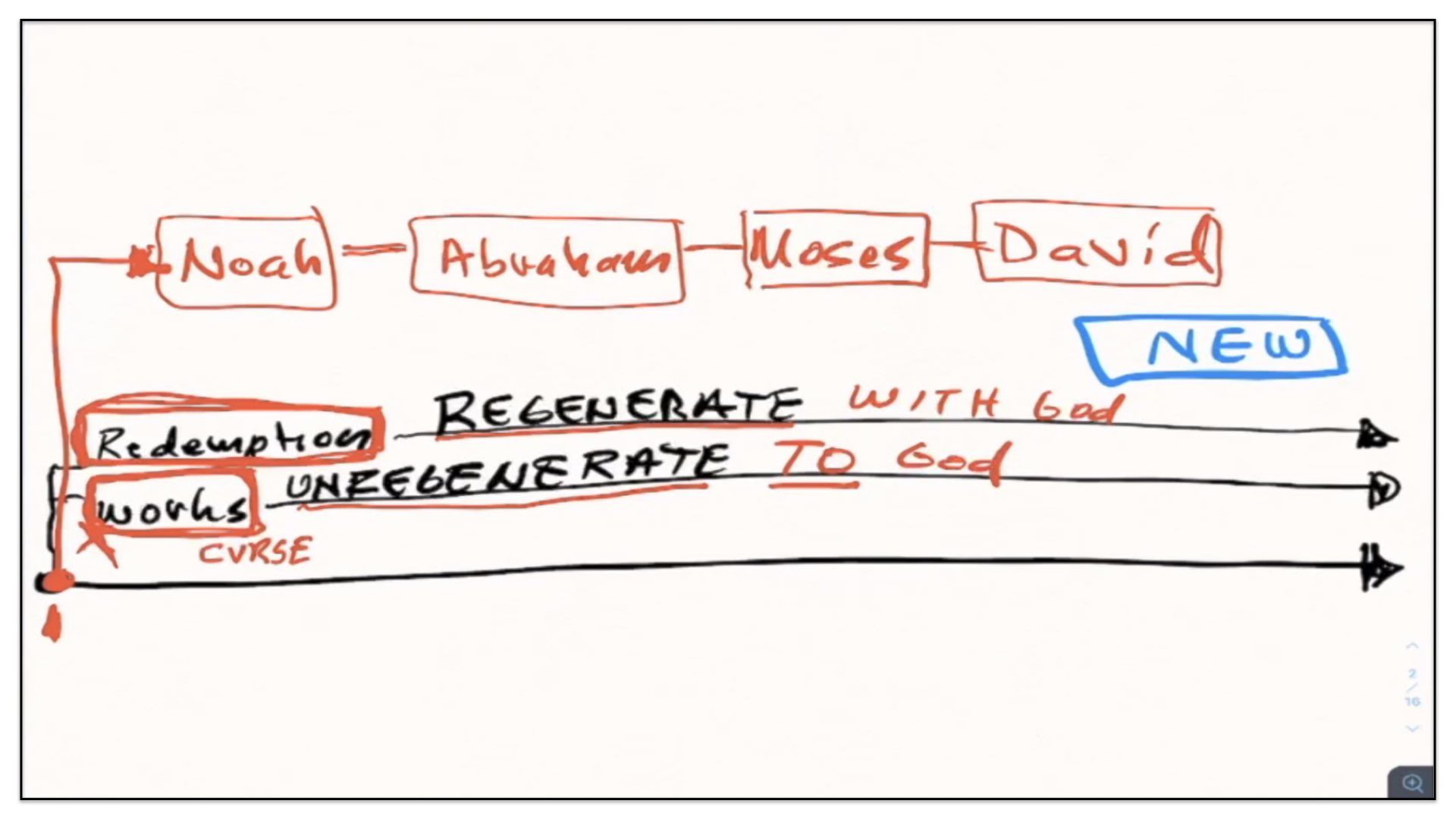
Let’s just use Adam and Eve as the illustration, since they are the first people to have been experientially brought under the Covenant of Redemption. Adam and Eve, as you know, were in relationship with God before they sinned under the authority of the Covenant of Works, which at that point was a blessing to them. But then, after they sinned, they remained under the authority of the Covenant to Works, but because of their sin, it became a curse to them, and their relationship with God changed to a relationship to God. In addition, the covenant, as I say, became a curse to them, insomuch that they were now sinners and therefore under the wrath of God, and facing judgment and condemnation. Now, they remained—and it only a short time for Adam and Eve—but they remained under the curse of the Covenant of Works and that authority and those responsibilities until the Spirit of God regenerated their souls. And when the Spirit of God granted them the blessing of regeneration, they were experientially brought under the authority of the Covenant of Redemption, and they were delivered from the authority of the Covenant of Works. When they were experientially brought under the Covenant of Redemption, all spiritual blessings in heavenly places were poured out upon them, and they truly were blessed.
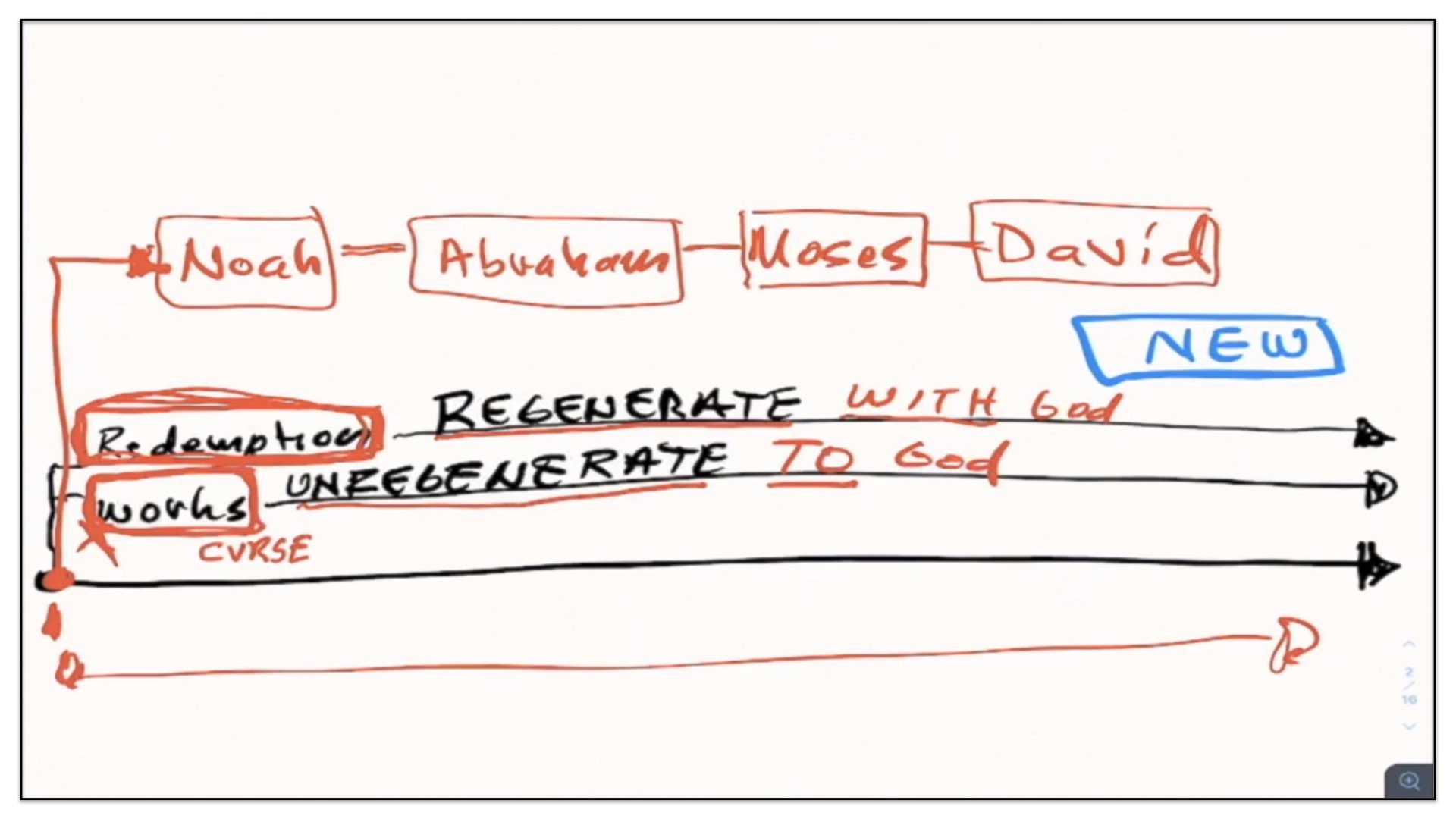
And you see, from that point forward, Adam and Eve onwards, throughout history, the entire human race has continued under the authority of one or the other of these two covenants. Everyone who was in an unregenerate condition is under the authority of the Covenant of Works, and they are held accountable by God for the obligations under that covenant—the heart law they are responsible to perfectly obey, and because they are sinners they are now responsible to suffer and pay the penalty of the sins they’ve committed against their Maker. But then, if those sinners are regenerated by the Spirit of God, they are delivered from the heart law, for Christ has kept it for them, and they’re delivered from the authority of the Covenant of Works and brought under the authority and blessings of the Covenant of Redemption. And they are given a relationship with God. And this has been true for every person throughout the course of history. These two covenants, therefore, are the spiritual parameters around which God relates to the members of the human race, whether they be Jews or Gentiles; whether they live before the Messiah was born or after the Messiah was born; from the beginning of this world to the end of this world; these are the two spiritual parameters around which God relates to the members of the human race, period. It’s that simple.
Throughout The Course Of History, God Administers His Grace To The Human Race—A Common Grace Unto Creation To The Non-Elect (With No Saving Virtue), And A Special Grace Unto Salvation To The Elect (With All Saving Virtue)
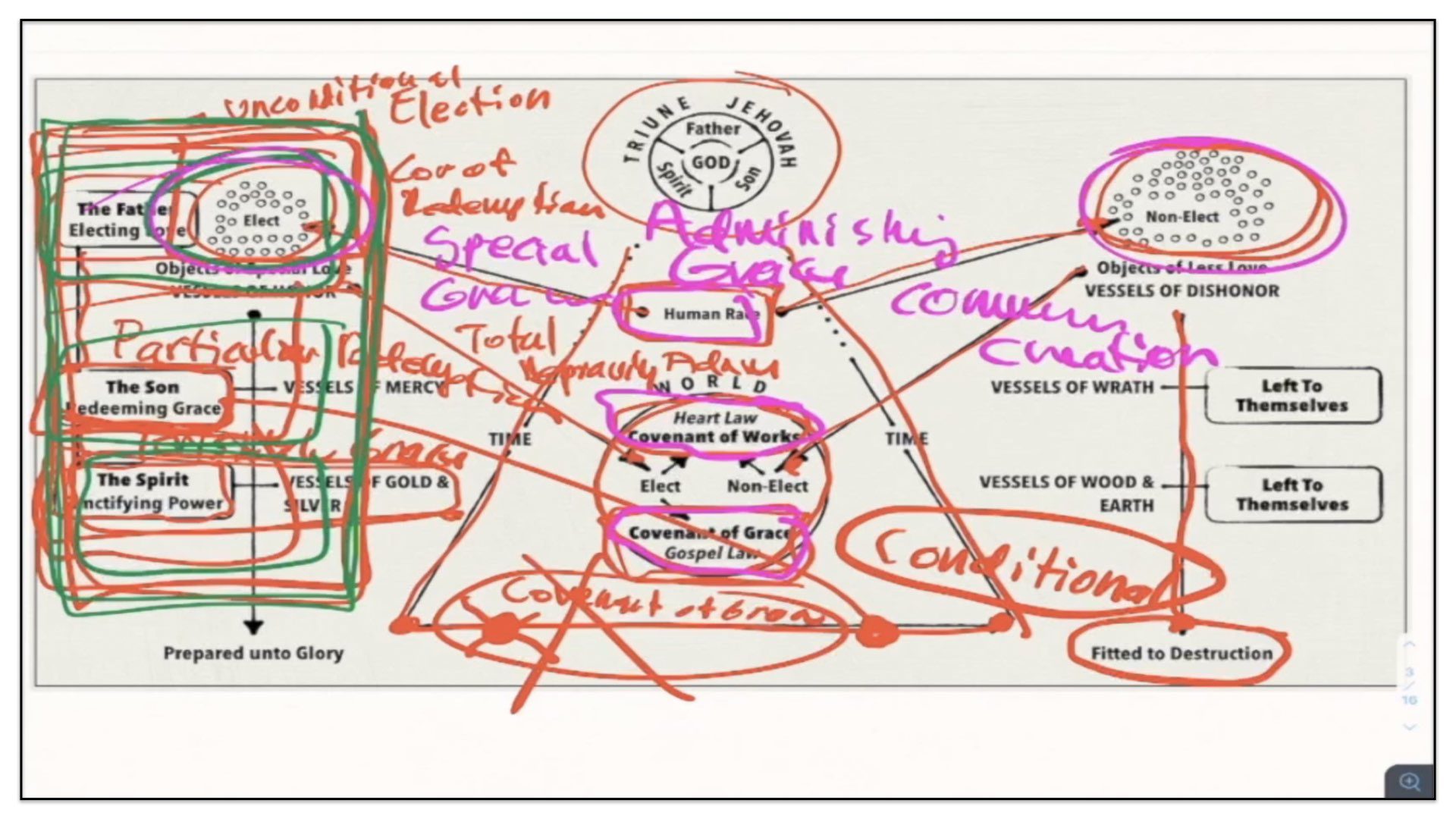
Now watch, it’s in this way that God’s masterplan for the ages—I’ll just change the color pen; I’ll use pink—It’s in this way that God’s masterplan for the ages may be summarized as God administering grace to the members of the human race. There is a common grace unto creation, which extends to the non-elect, but there’s no saving virtue or value in that at all. However, there is a special grace unto salvation, and that grace is designed for, promised to, the elect alone. And this is what God is doing throughout the course of history. God is managing, governing, controlling, relating to the members of the human race under one or the other of these two covenants. That’s what I mean when I say these covenants are spiritual—the spiritual parameters around which God manages this world.
They Are Perpetual Covenants
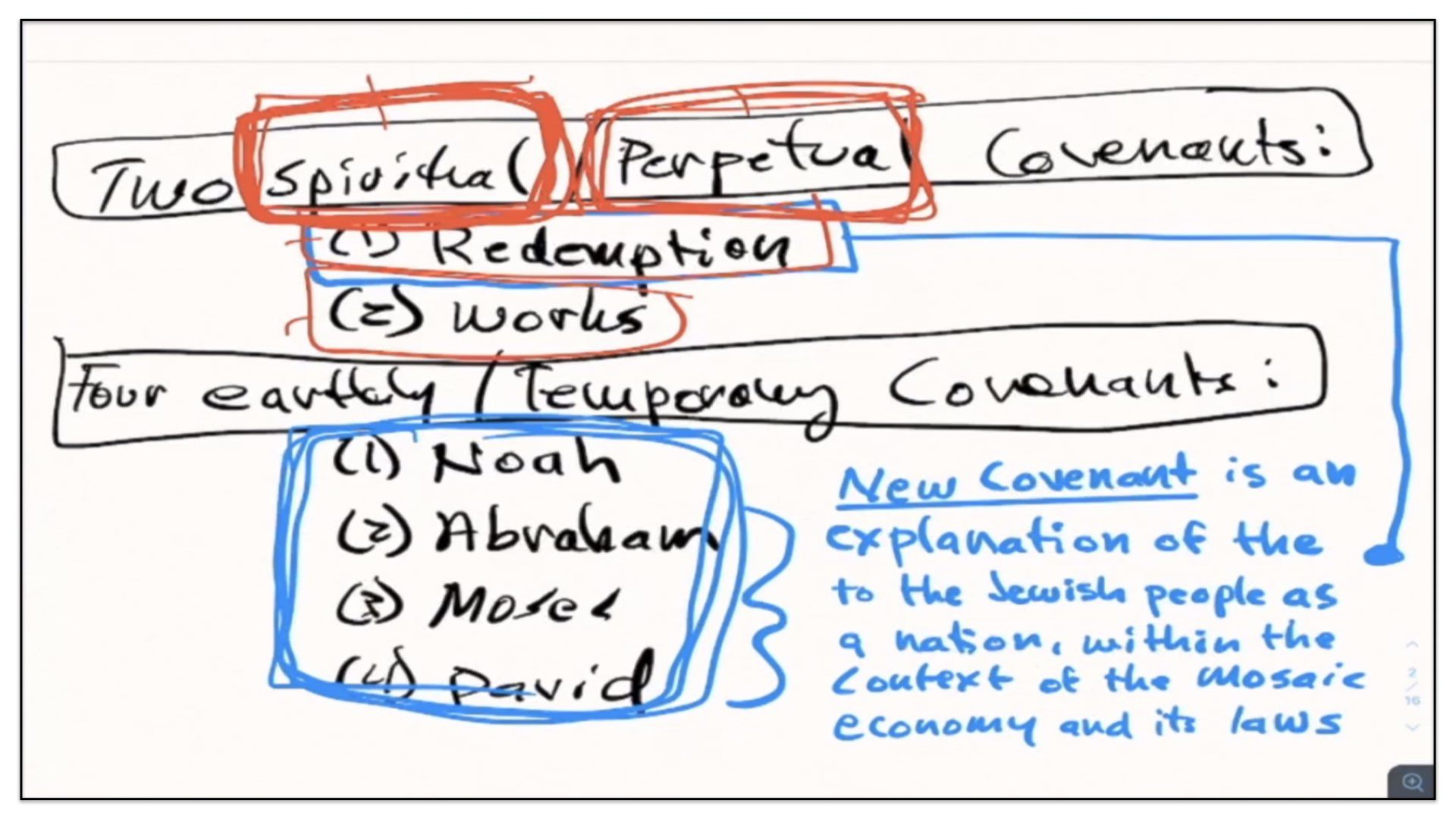
Now, let me say something to you about this other word—perpetual. What do I mean when I say these two covenants are perpetual? I mean, they are permanent. Looking back at the diagram with the timeline, they are permanent.
They Were Activated In The Garden Of Eden And Will Continue Forever
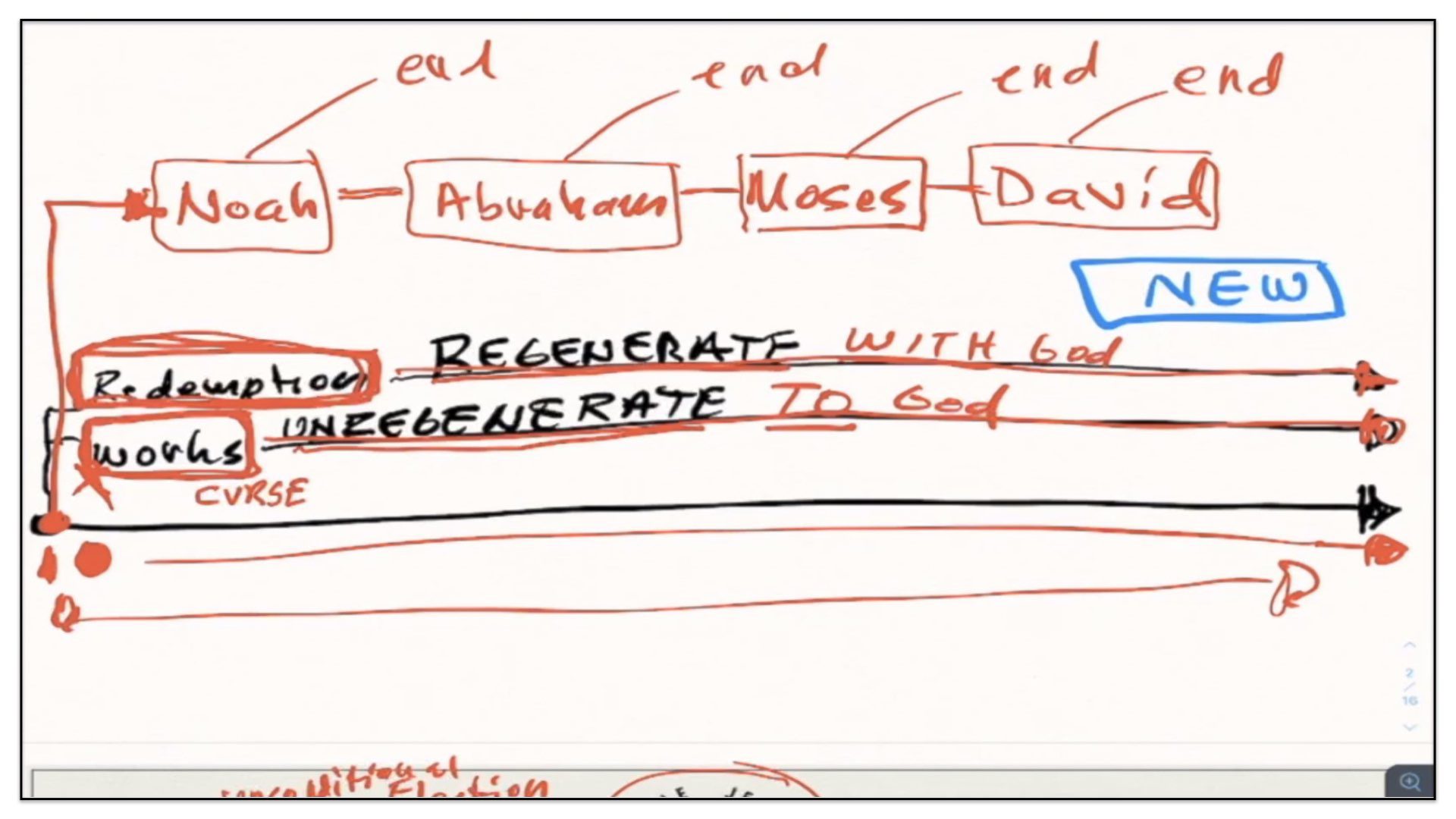
Look. They extend throughout the course of history and have no end. Unlike these earthly covenants above—Noah, Abraham, Moses, David—these do have an end. These have or will terminate. But not so for the Covenant of Works and the Covenant of Redemption. Both of these covenants—watch—both of these covenants were activated in the garden of Eden, and they will continue in the world to come.
The Elect Will Forever Be Under The Authority And Blessings Of The Covenant Of Redemption In Heaven
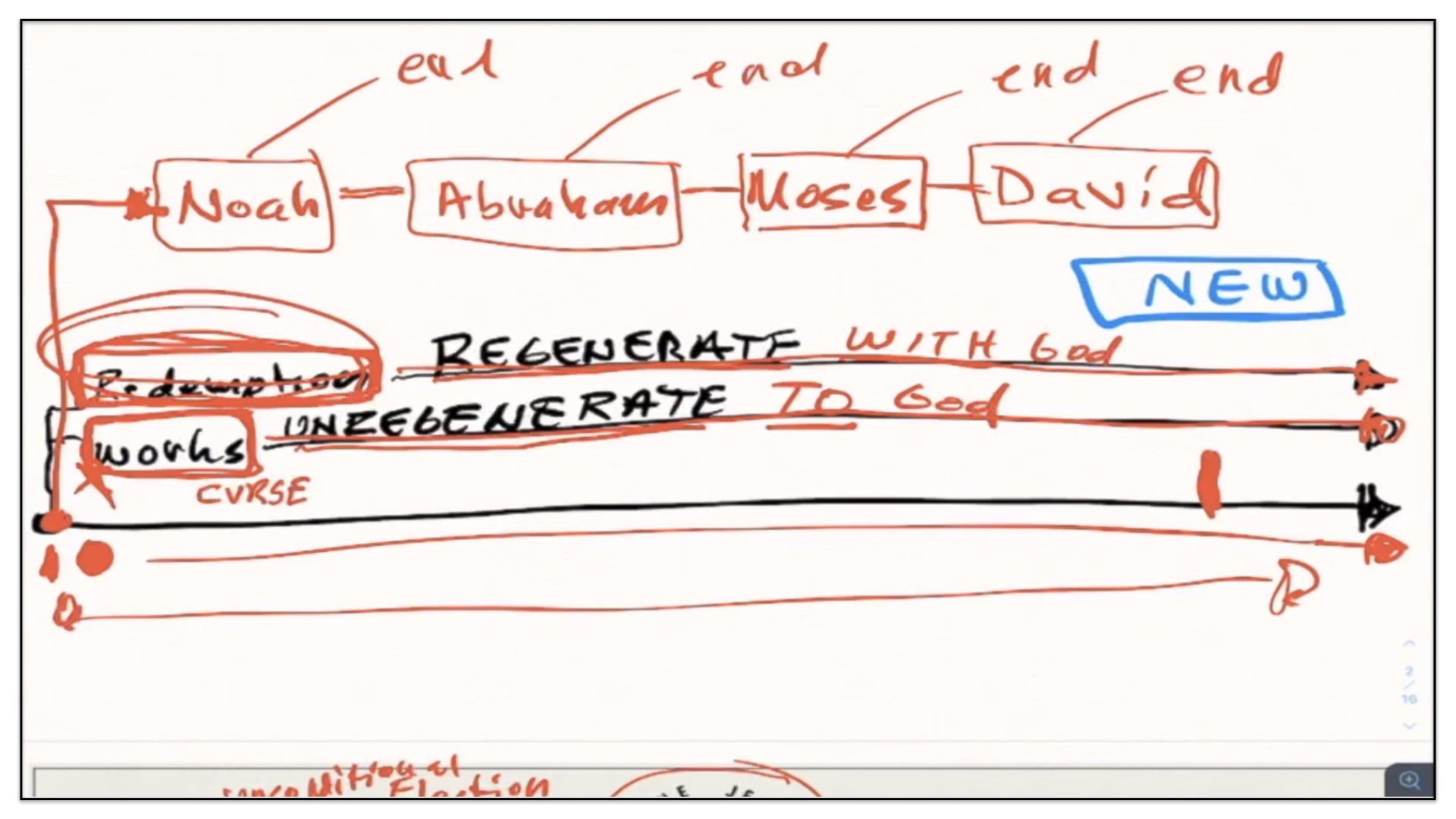
You see, and let me put it in this way—when Christ returns, those who are given a place in heaven—God’s regenerate people—they will forever remain under the authority of the Covenant of Redemption. That’s why they’re given a place in heaven.
The Non-Elect Will Forever Be Under The Authority And Curse Of The Covenant Of Works In Hell
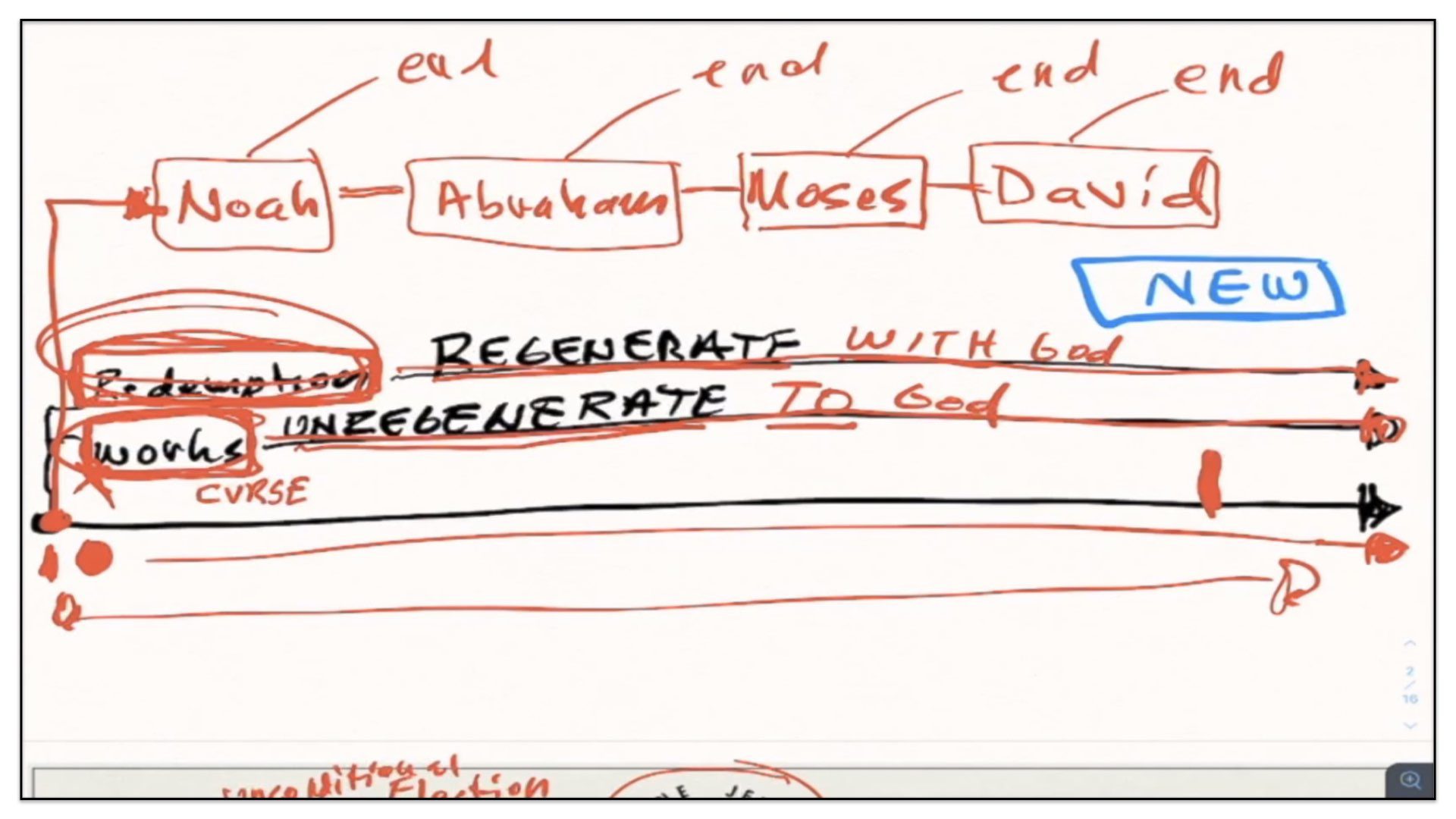
And, those persons who will be consigned to Hell—the unregenerate—they will forever remain under the authority of the Covenant of Works. And it’s for that reason they are consigned to hell.
At No Time Are The Non-Elect Released From The Covenant Of Works, Nor The Elect Released From The Covenant Of Redemption
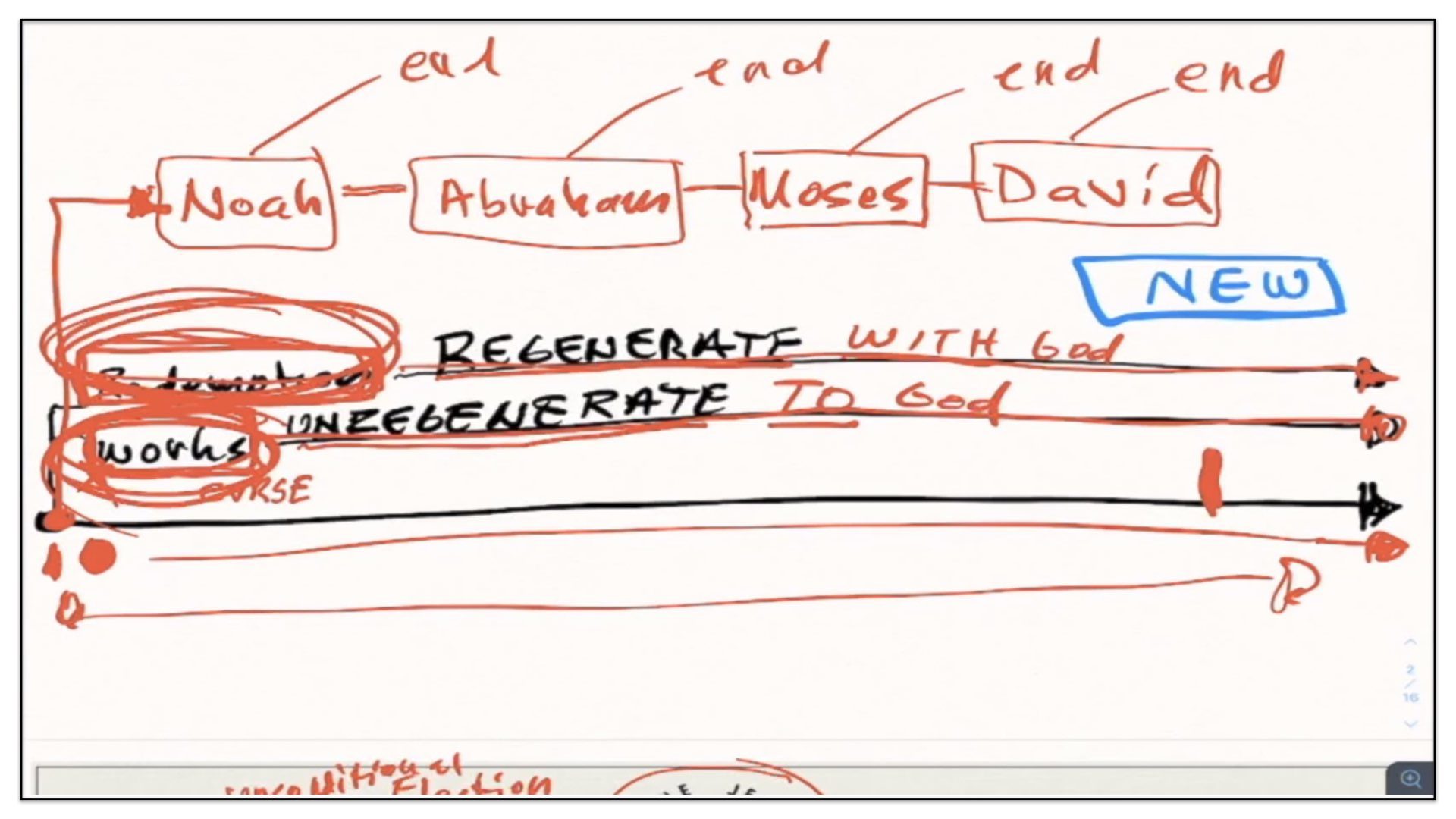
I hope you see that, my dear friends. At no time are saints in heaven released from the authority and the blessings of the Covenant of Redemption. And at no time are the sinners in hell released from the authority and curse of the Covenant of Works. These are perpetual, or permanent, never-ending covenants.
A Final Word
And so, to tie all of this together and bring the teachings to a conclusion. Watch:
The Two Spiritual Covenants Transcend The Four Earthly Covenants
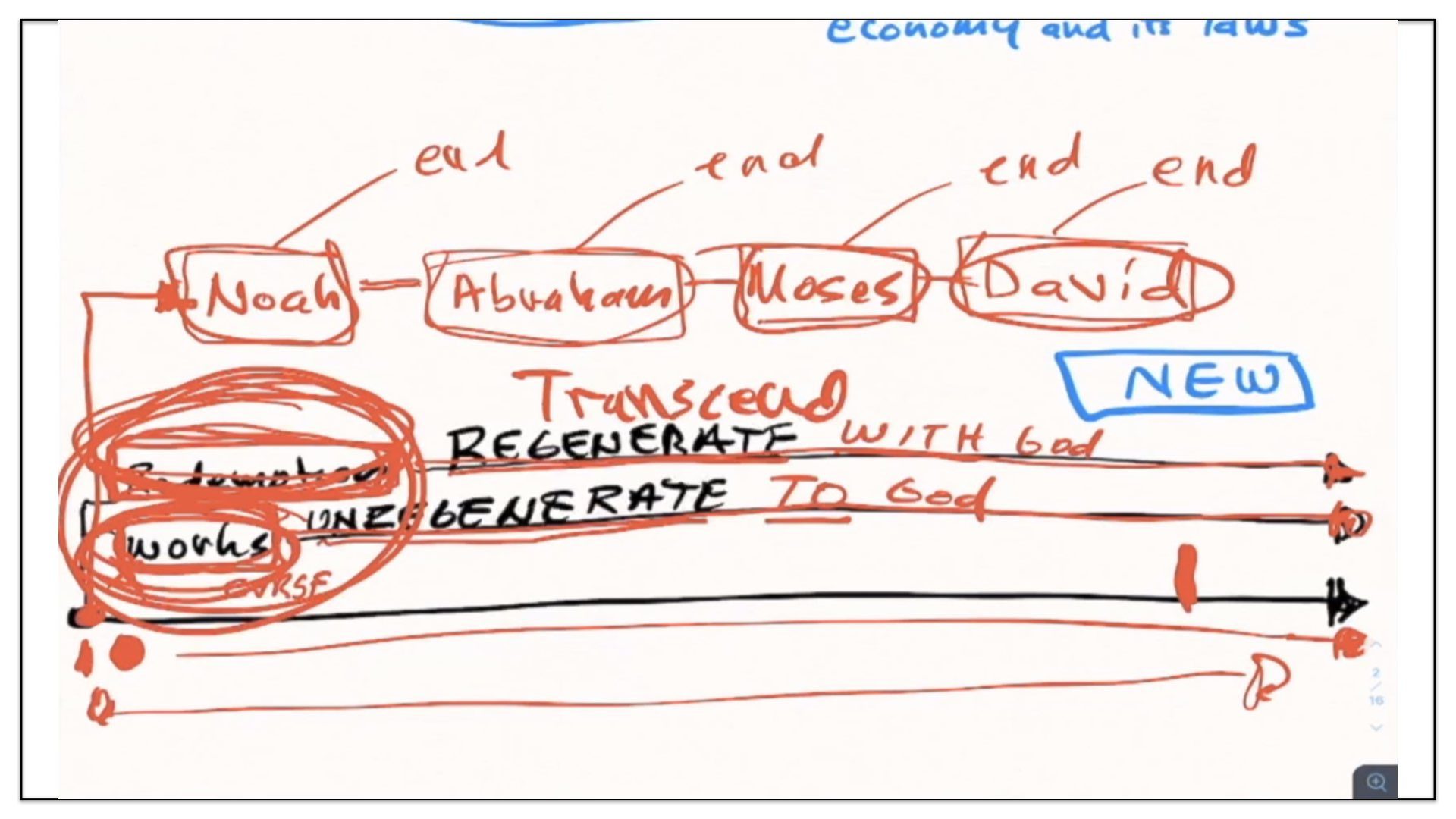
If these two covenants are spiritual and perpetual, whereas the other four covenants are earthly and temporary, then the only conclusion to be drawn is that these two covenants transcend the other covenants. And what I mean is this—the two spiritual covenants are larger than the four earthly covenants. The two spiritual and perpetual covenants are more extensive, and comprehensive, than the four earthly covenants. The bottom line is this, and please listen to me, the two spiritual covenants—and these covenants alone, that of Works and that of Redemption—they are the parameters around which God relates to the various members of the human race. He either sustains a relationship to them based on the authority of the Covenant of Works, or He sustains a relationship to them based on the authority of the Covenant of Redemption, or the Covenant of Grace.
Your Responsibility Towards God Is Determined And Defined By The Covenant Under Which You Are Subject To Him
Now my dear friends, listen, if you want to know what the Bible teaches about your responsibilities towards God and the basis on which God relates to you or God relates with you, then the answer to those questions are to be found in one of these two covenants—the Covenant of Works or the Covenant of Redemption. These other four Covenant cannot help you, with regards to your personal relationship with God, or to God. The four earthly covenants were given for a different purpose; they were made with the different group of people; and it has nothing to do with personal responsibility towards God under the Covenant of Works, or a personal relationship with God under the Covenant of Redemption. Now you see, that’s why these two covenants are of supreme importance, when we come to look and consider the arrangement of the covenants of the Bible.
To Avoid Confusion And Evade Error, Do Not Conflate The Two Spiritual Covenants With The Four Earthly Covenants
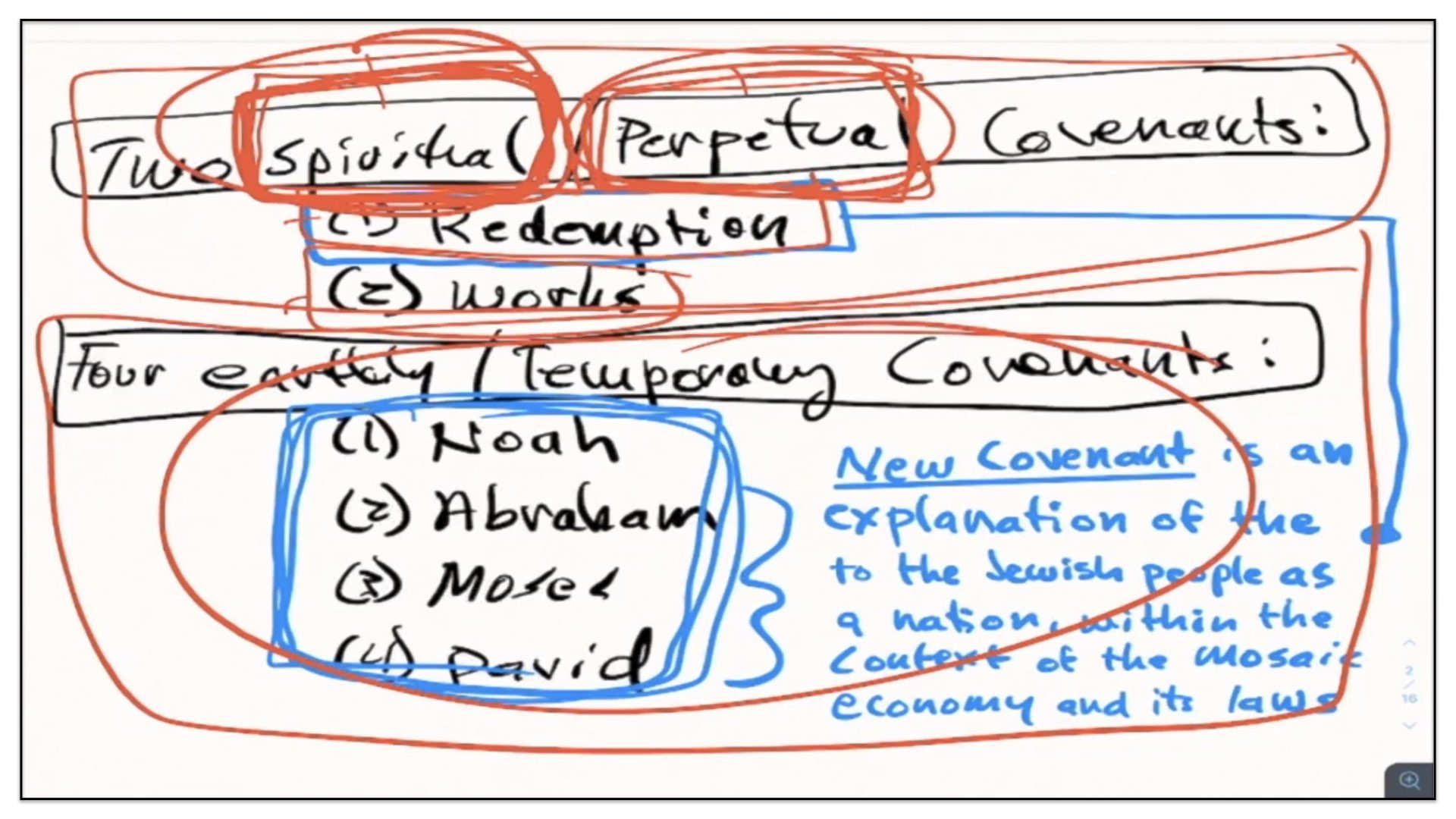
Now, the final words. In my view, what I presented to you is quite simple and straightforward. It really is not complicated. By separating the two permanent covenants from the four earthly covenants, we’re able to untangle things which never should have been tied together, like the Presbyterians and the Reformed Baptists have done. They have tied together spiritual covenants with earthly covenants. They’ve tied together permanent covenants with temporary covenants. And boy have they made a mess of Bible Exposition and the framework of systematic theology. Listen, rather than unfolding the gospel of God throughout the scriptures, Presbyterians and the Reformed Baptists obscure the gospel, by shrouding it in earthly and temporary covenants. I say be done with that. Get to the purity of the message of the Bible. It’s a two-fold message. One for those who are under a Covenant of Works and a message for those that are under the Covenant of Grace. It’s that simple. It’s that straightforward. It’s that clear. Let’s not obscure it any longer. That’s my appeal and my challenge to anyone watching this set of teachings.
Alright, well, I have to leave the teachings here. And I look forward to next time when I hope to bring some teachings on what I believe concerning the four earthly covenants. That should prove to be a very interesting study we’ll have together. Until then, I’d like to wish upon you as always, the blessings of the Lord.
Jared Smith served twenty years as pastor of a Strict and Particular Baptist church in Kensington (London, England). He now serves as an Evangelist in the Philippines, preaching the gospel, organizing churches and training gospel preachers.
Jared Smith's Online Worship Services
Jared Smith's Sermons
Jared Smith on the Gospel Message
Jared Smith on the Biblical Covenants
Jared Smith on the Gospel Law
Jared Smith on Bible Doctrine
Jared Smith on Bible Reading
Jared Smith's Hymn Studies
Jared Smith on Eldership
Jared Smith's Studies In Genesis
Jared Smith's Studies in Romans
Jared Smith on Various Issues
Jared Smith, Covenant Baptist Church, Philippines
Jared Smith's Maternal Ancestry (Complete)




